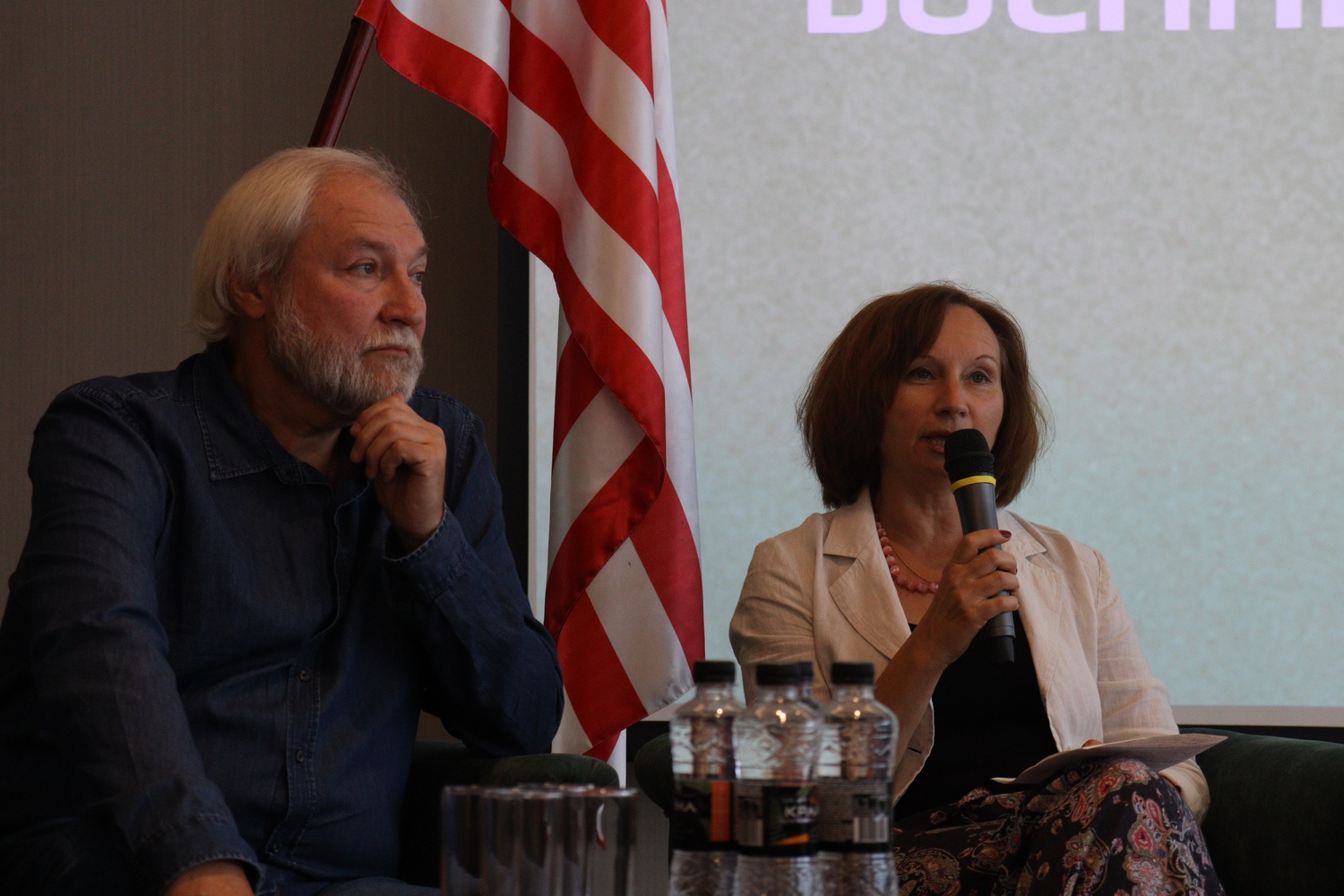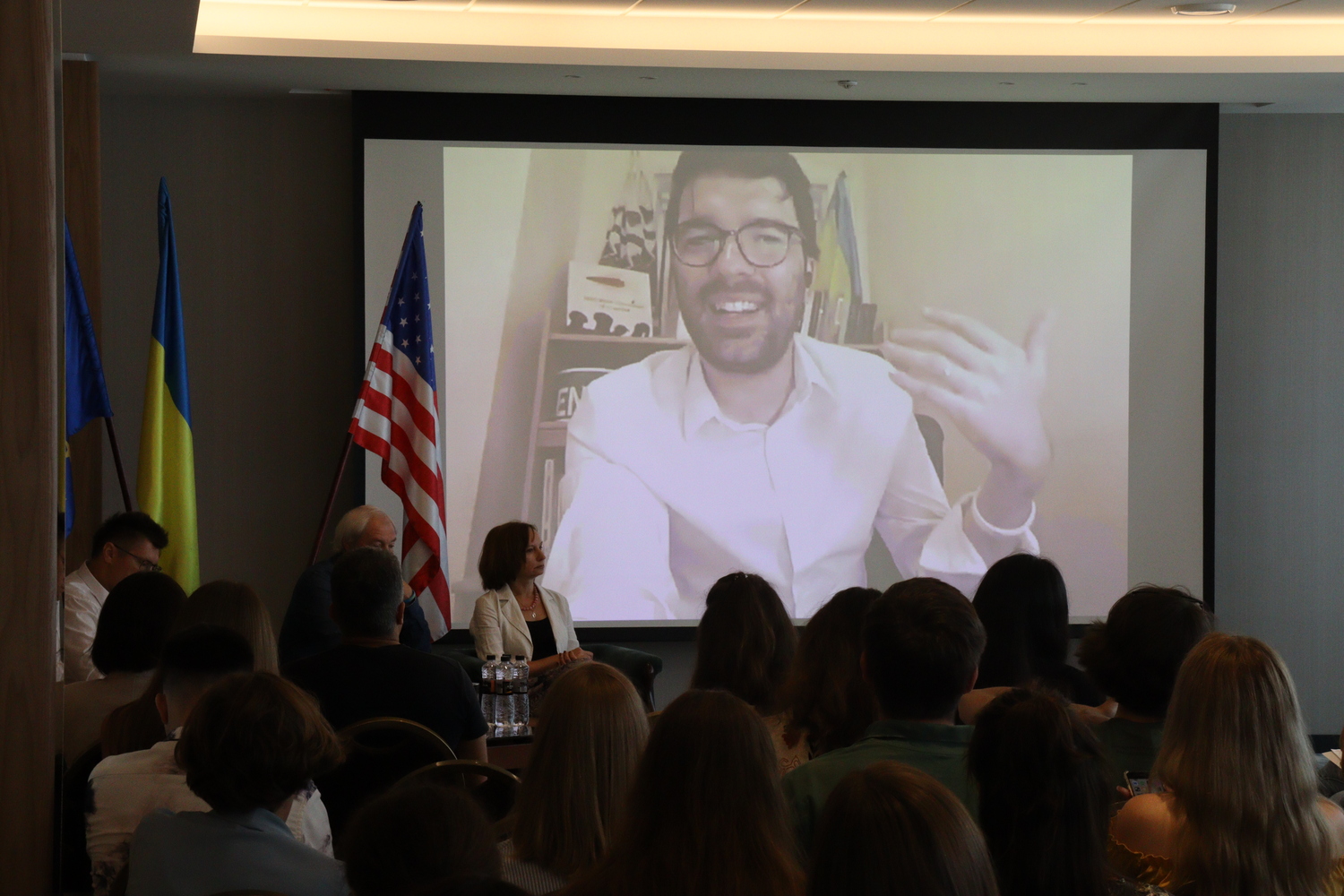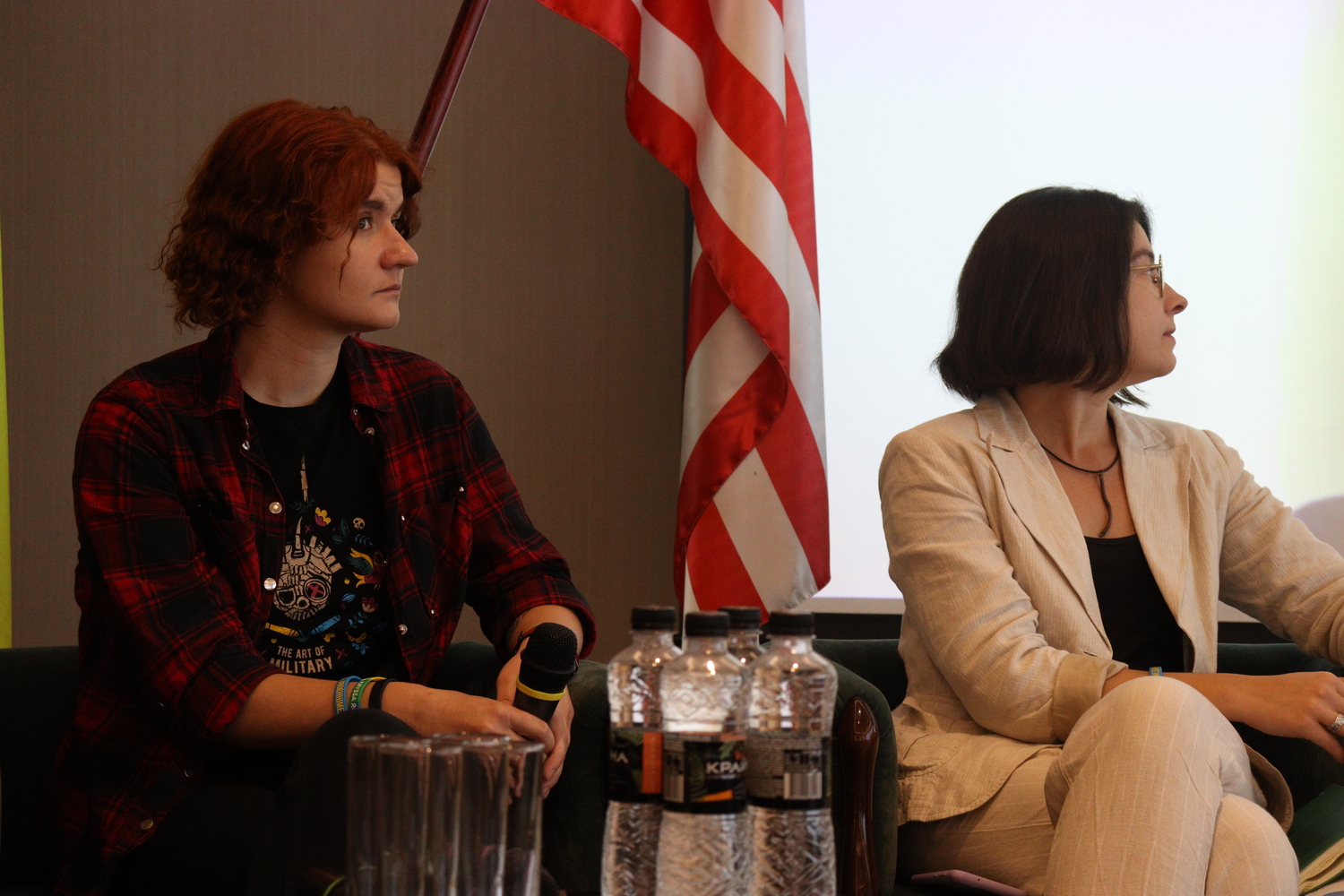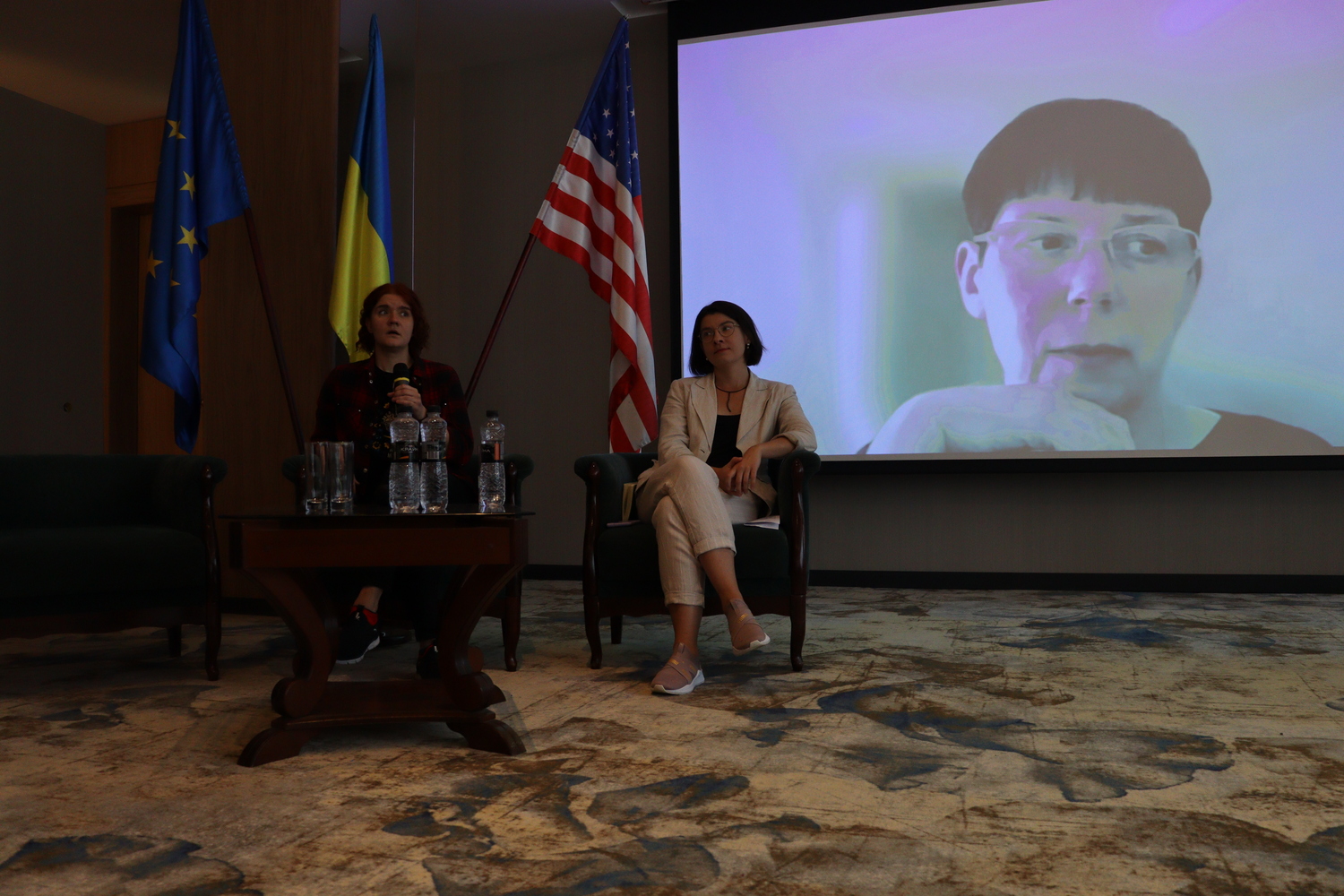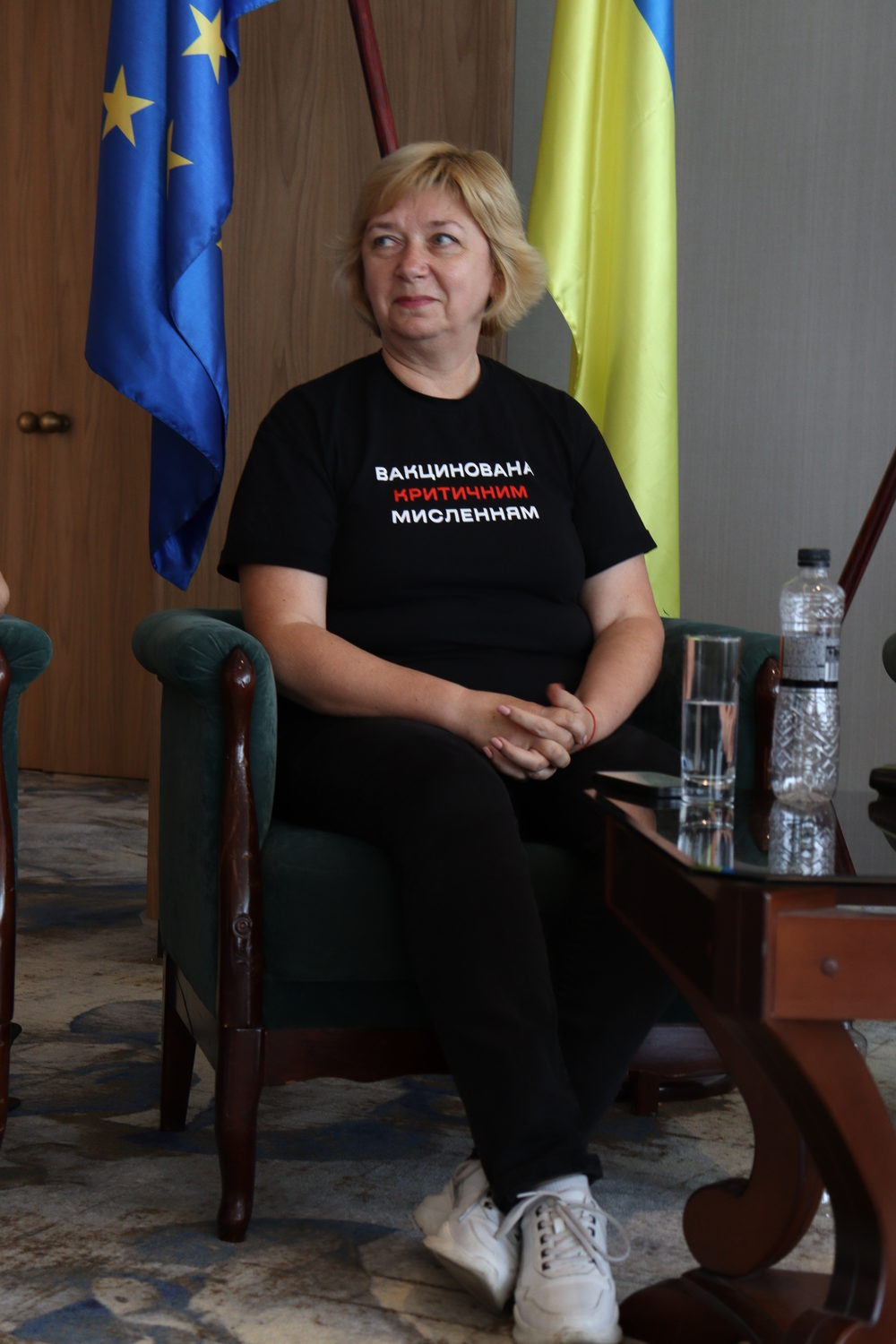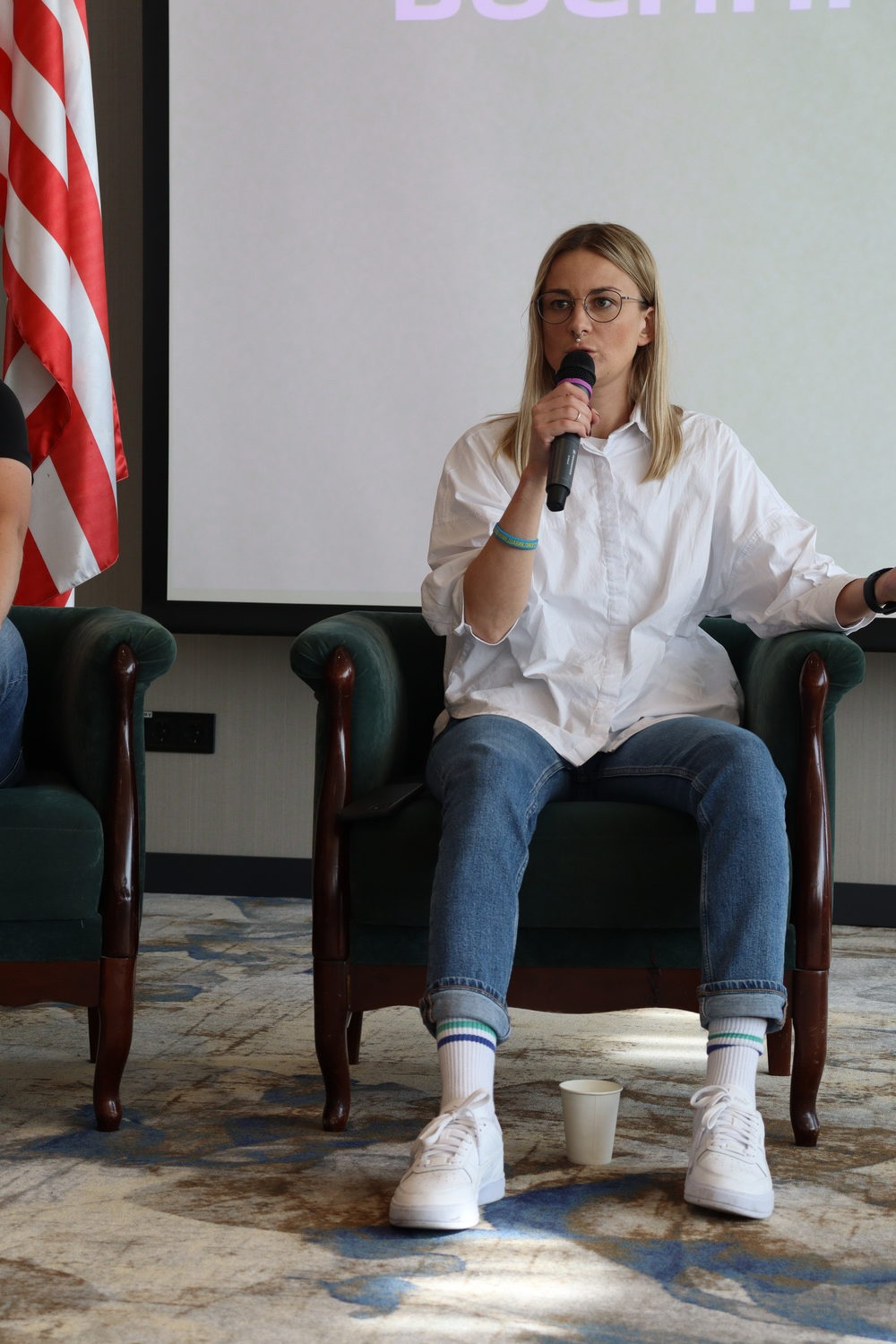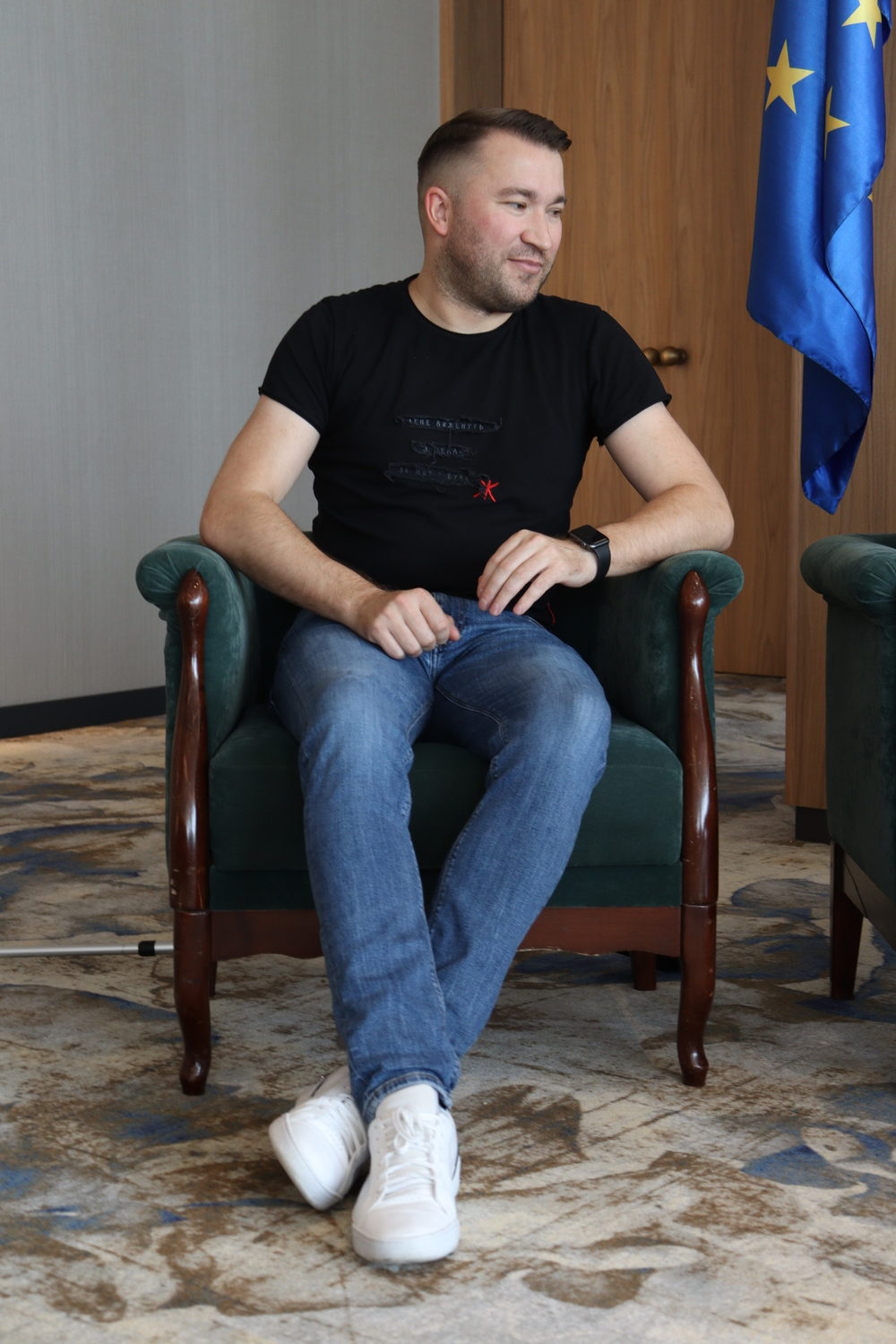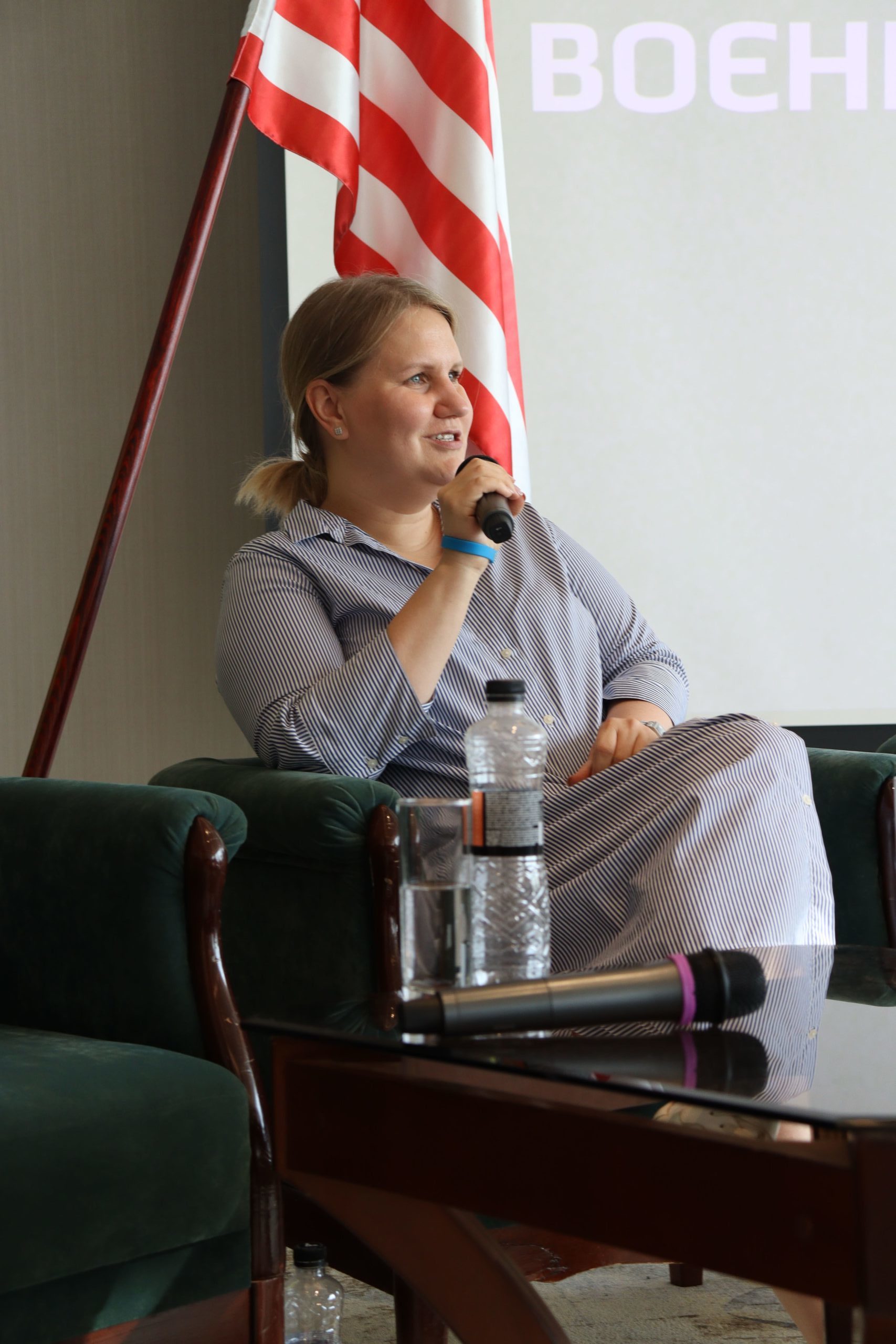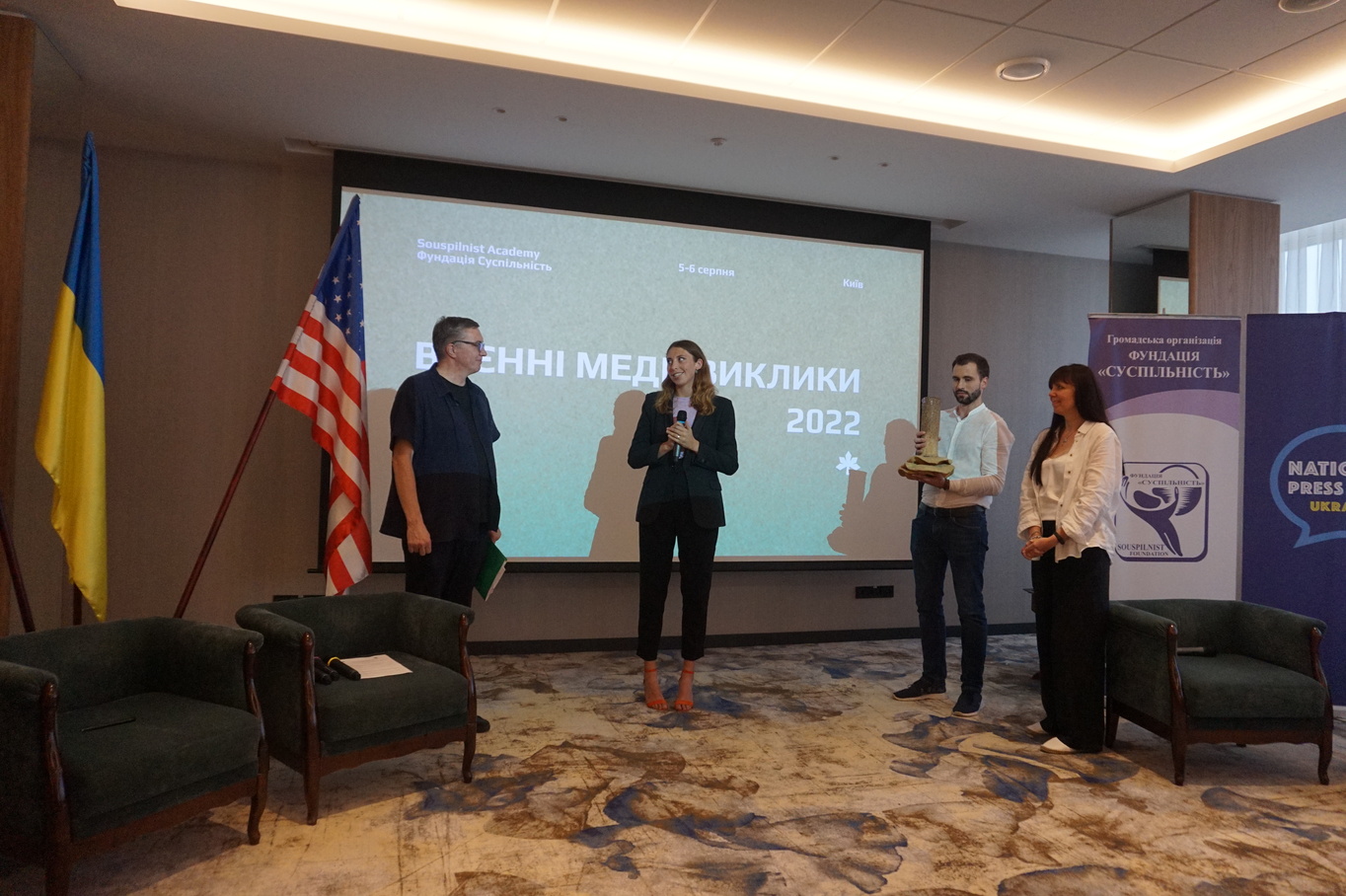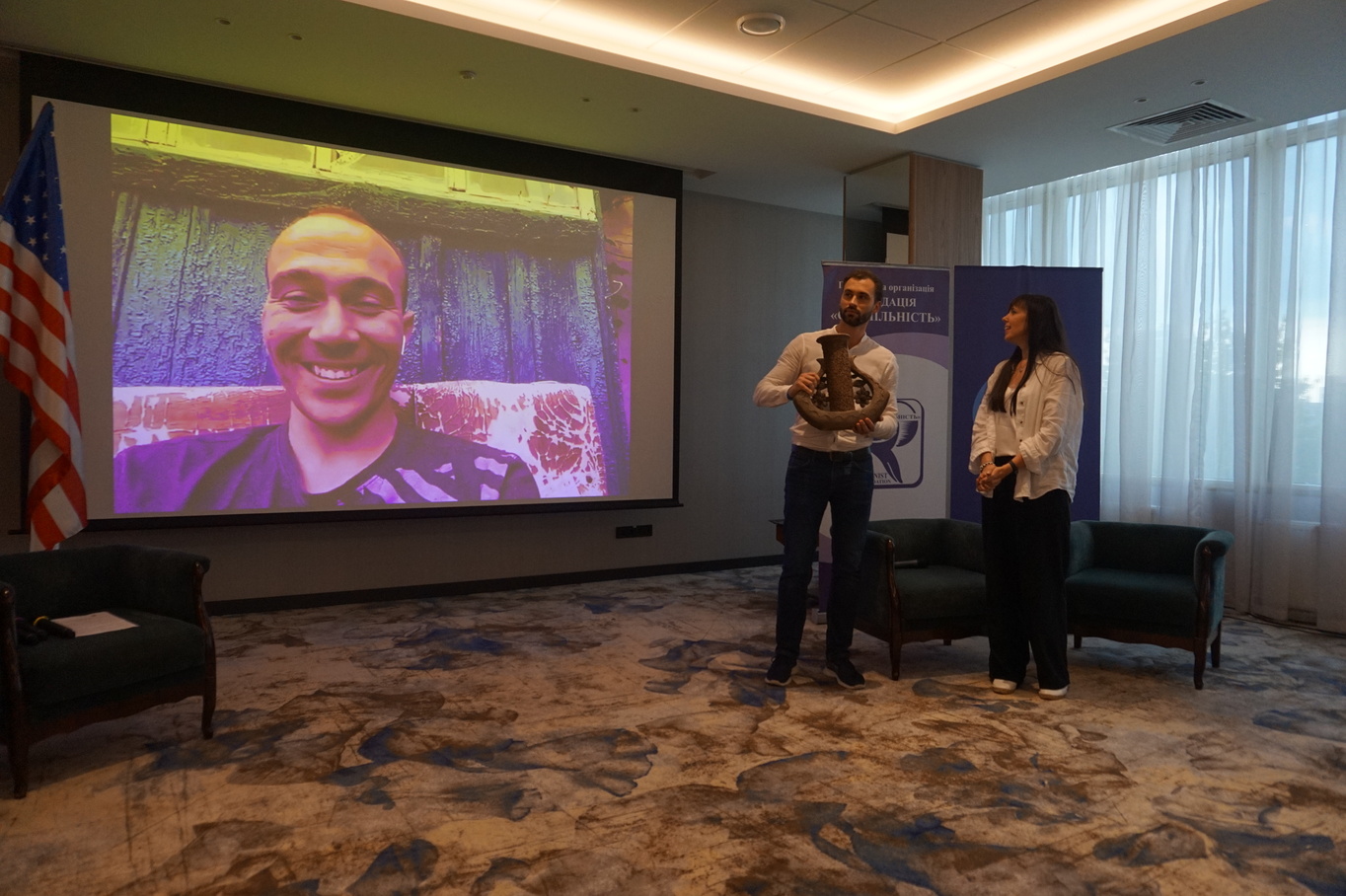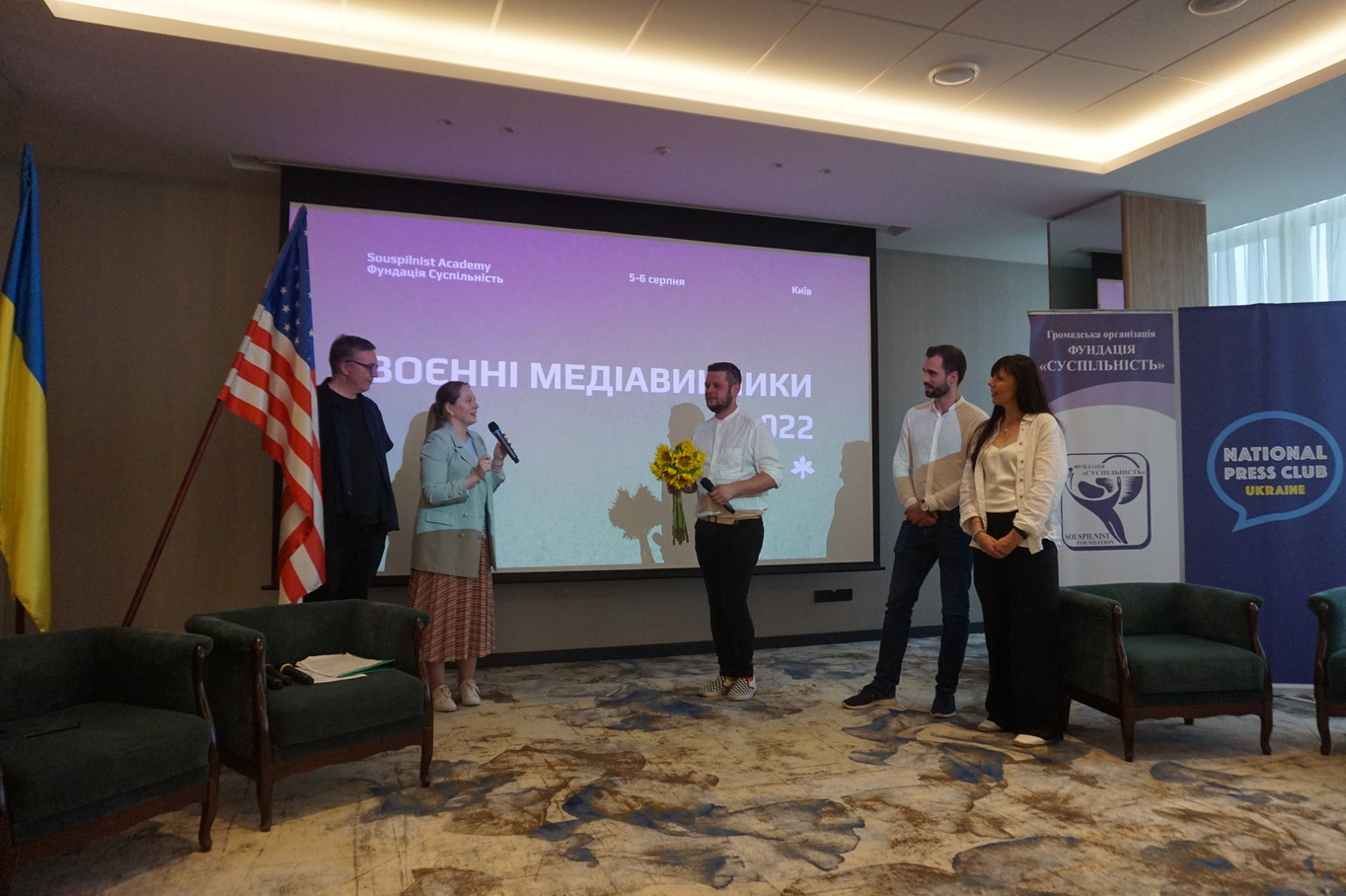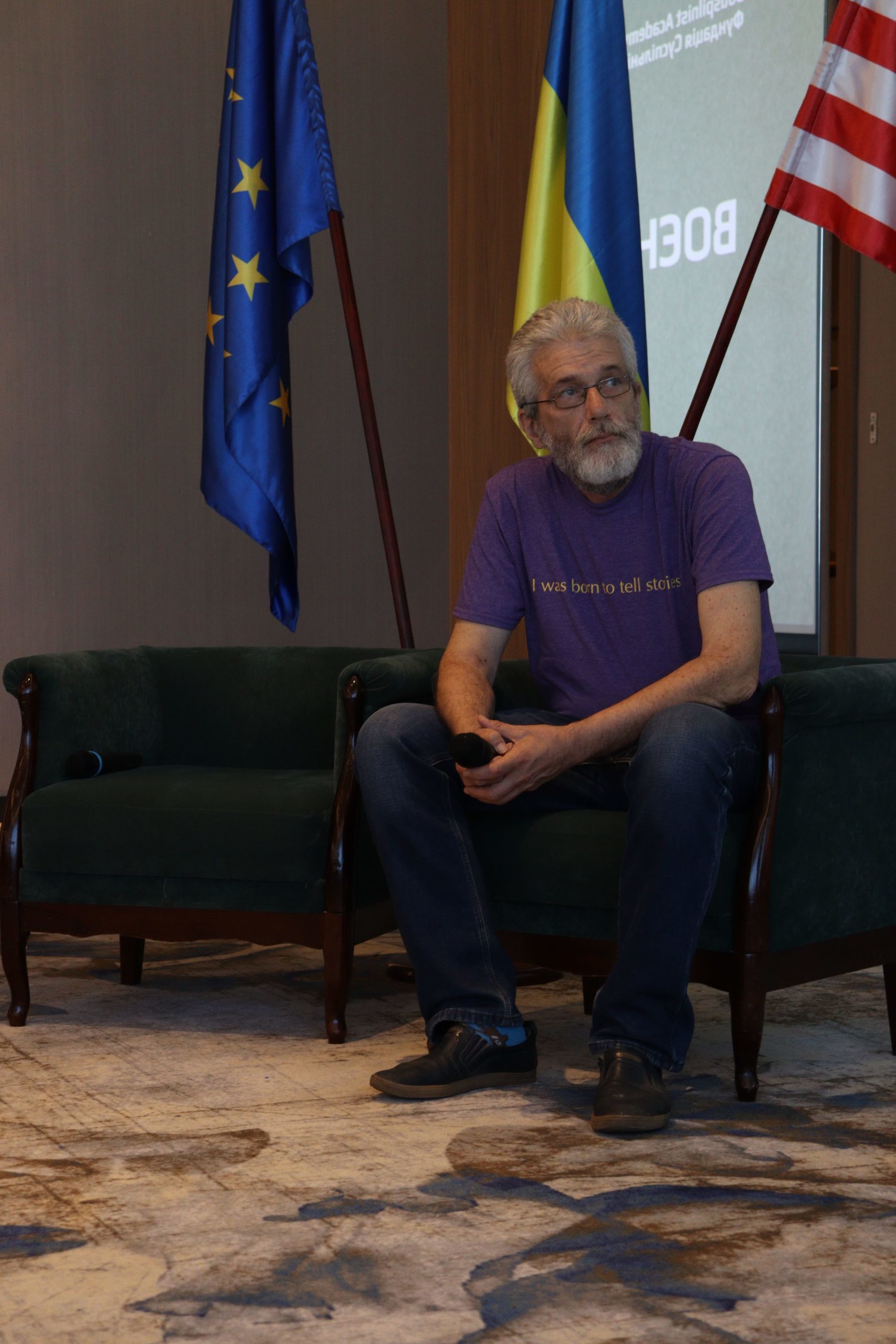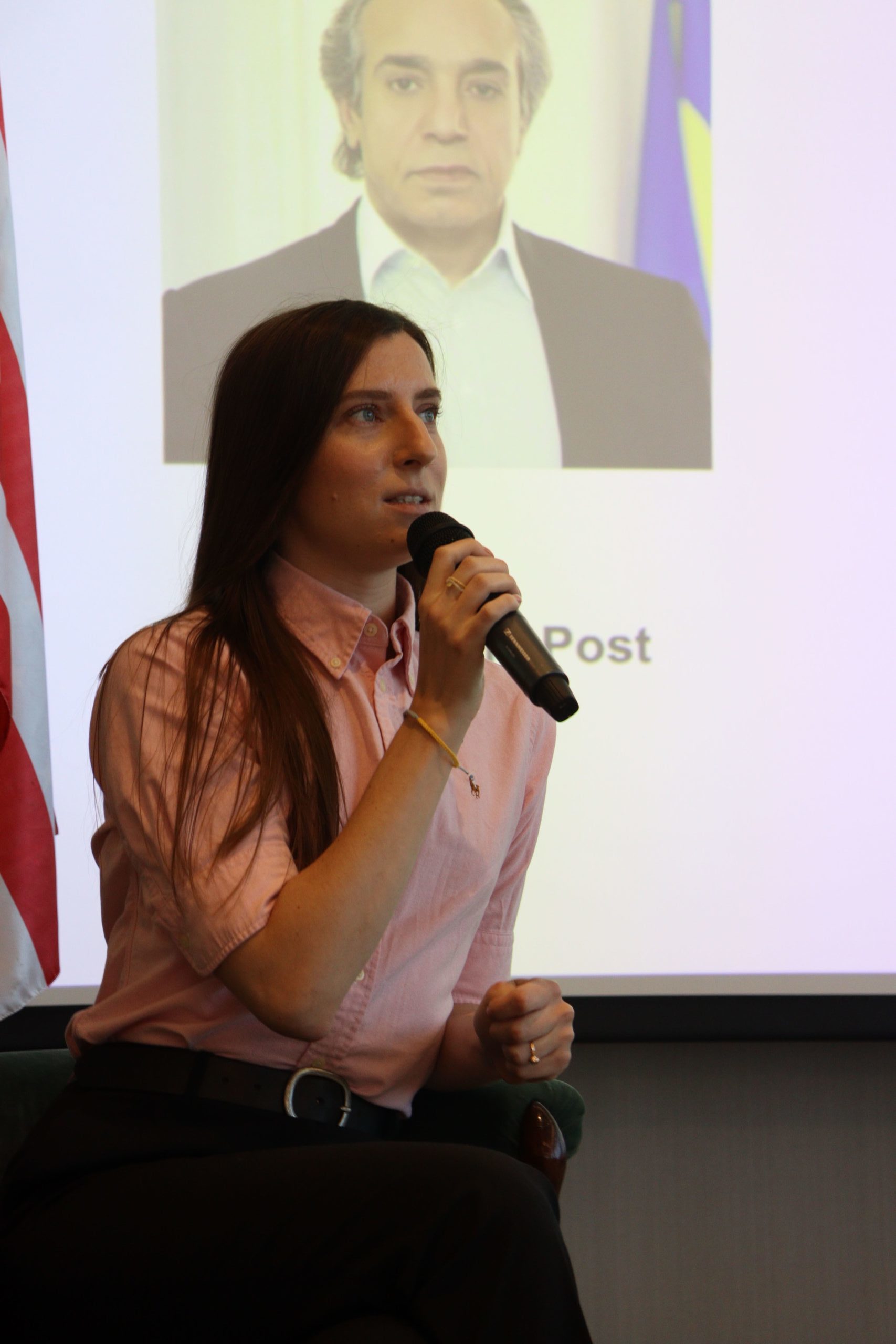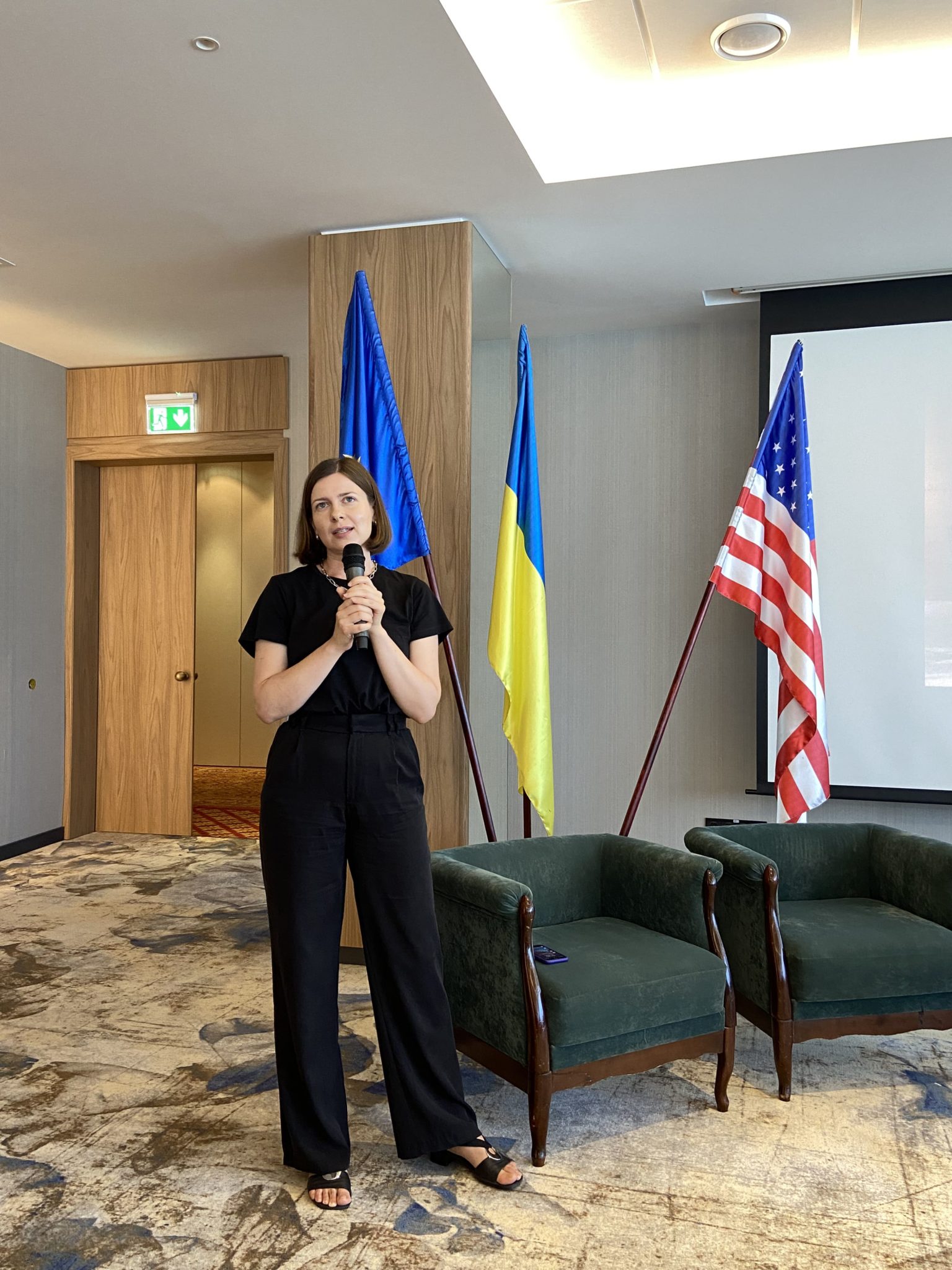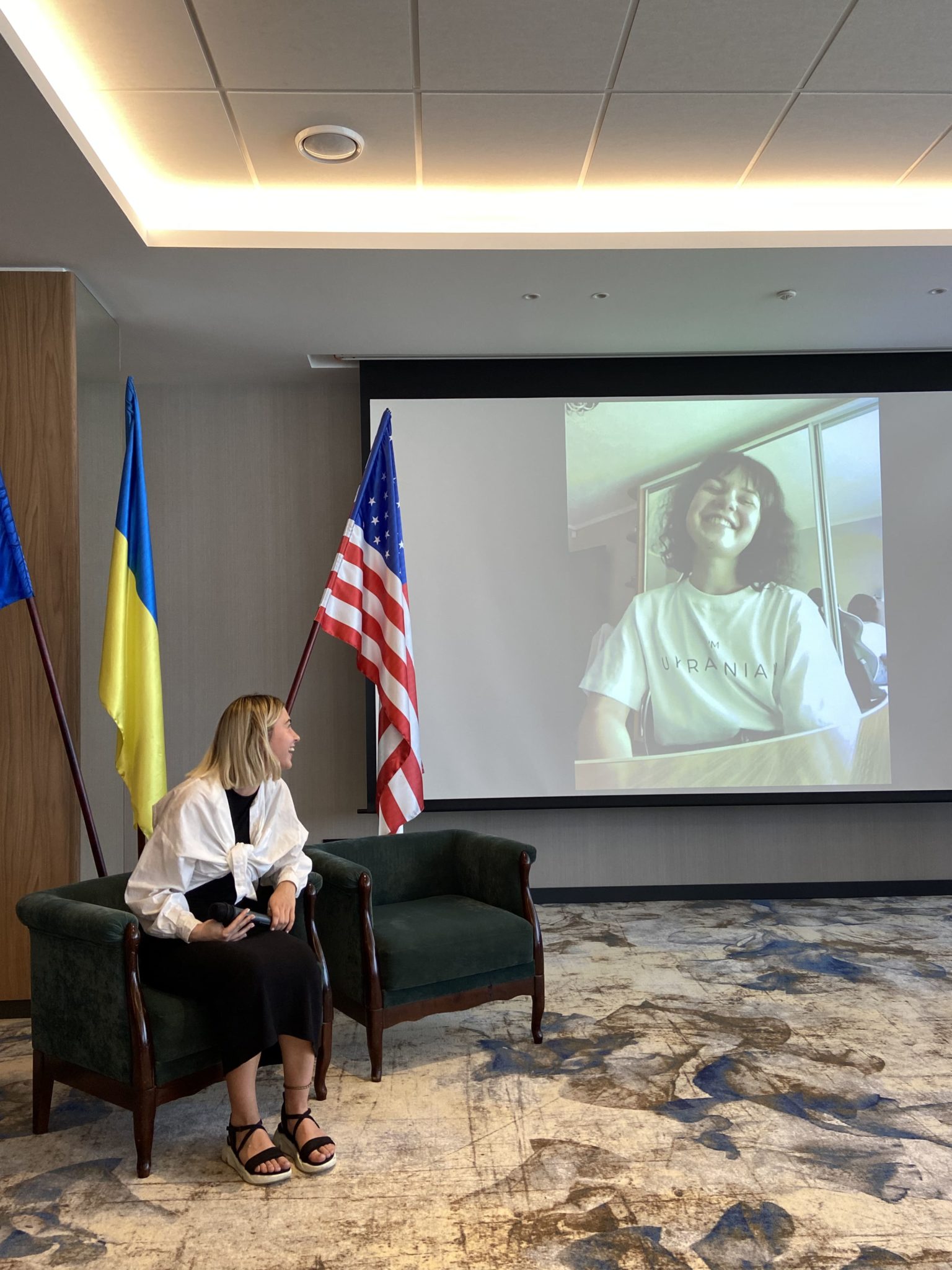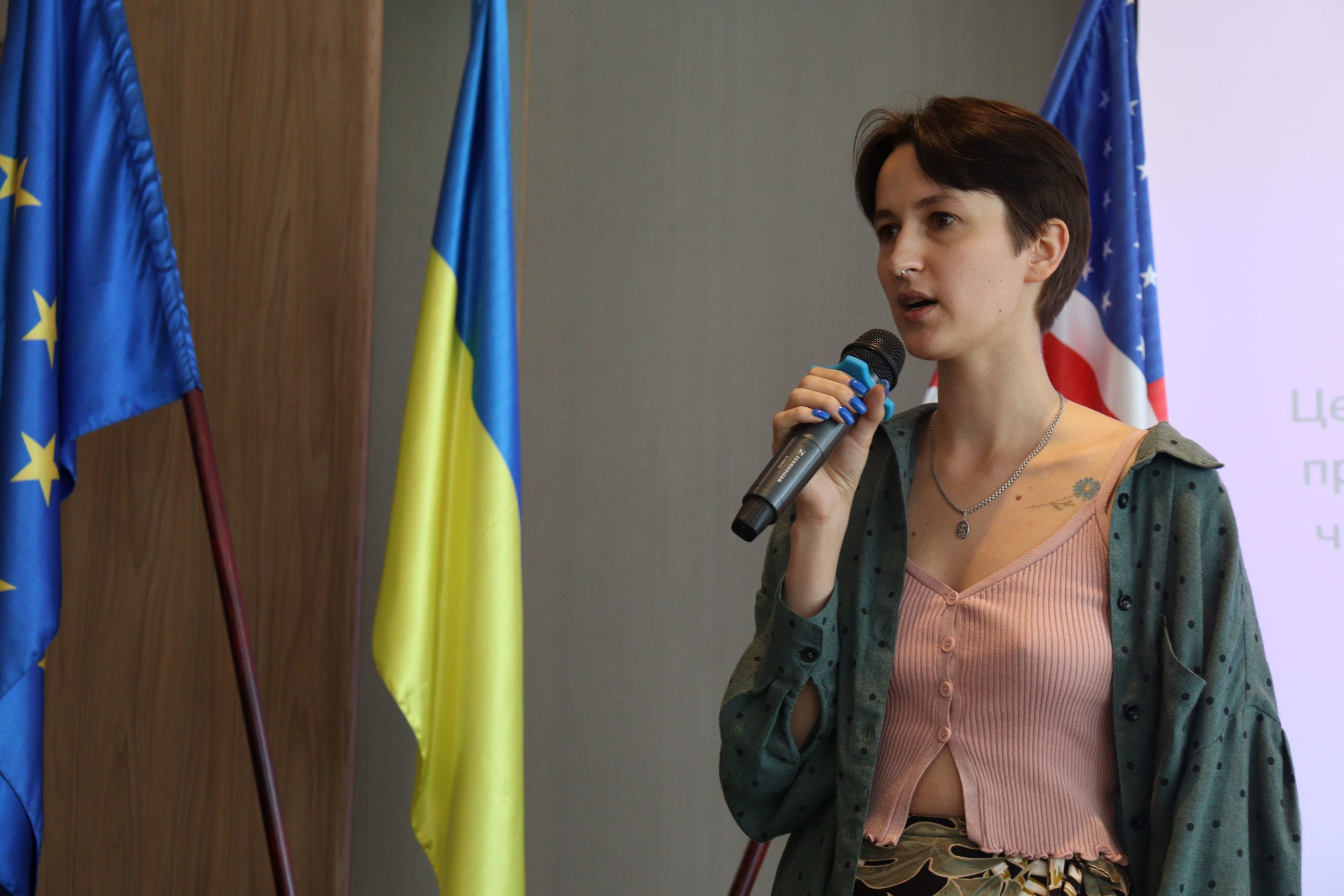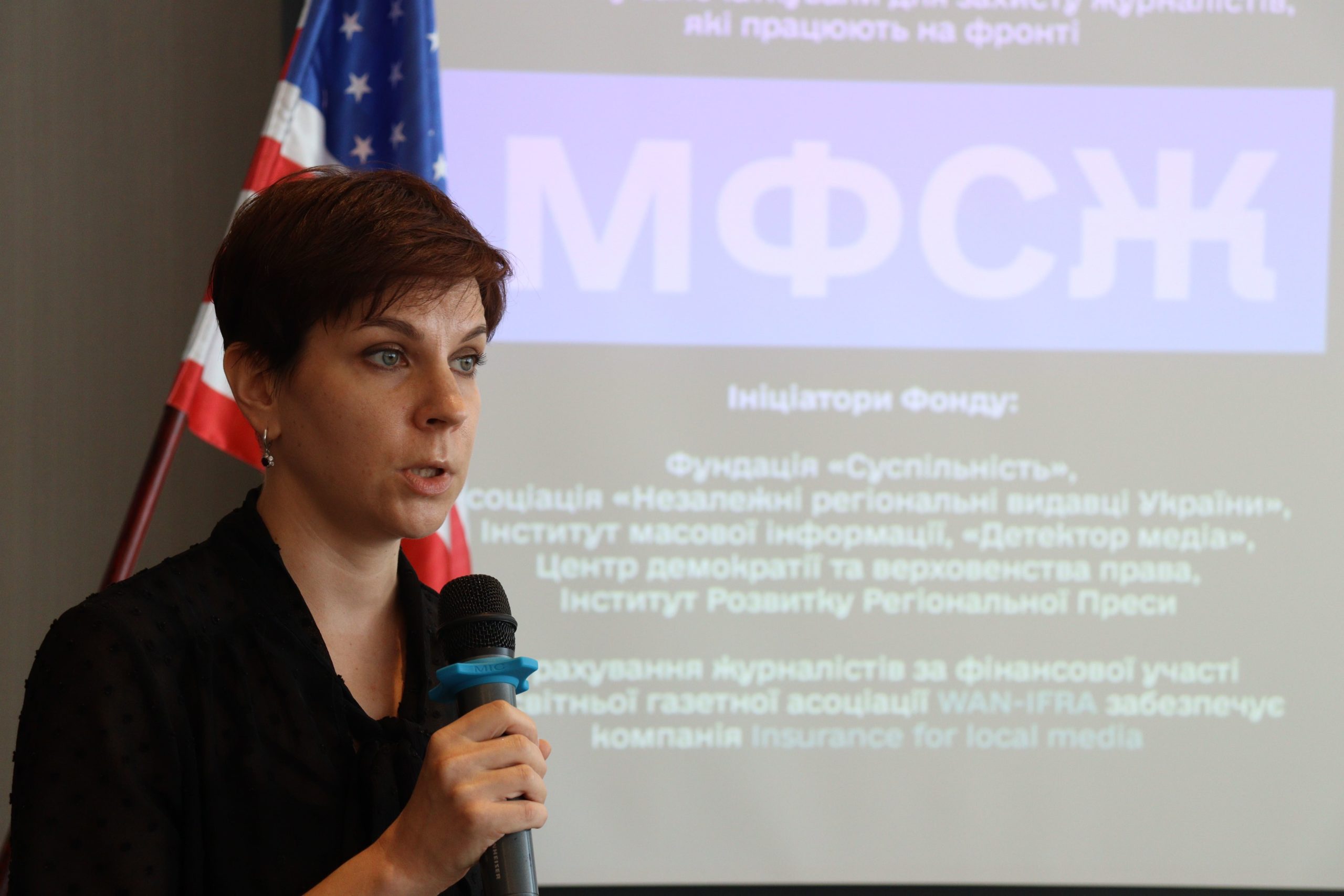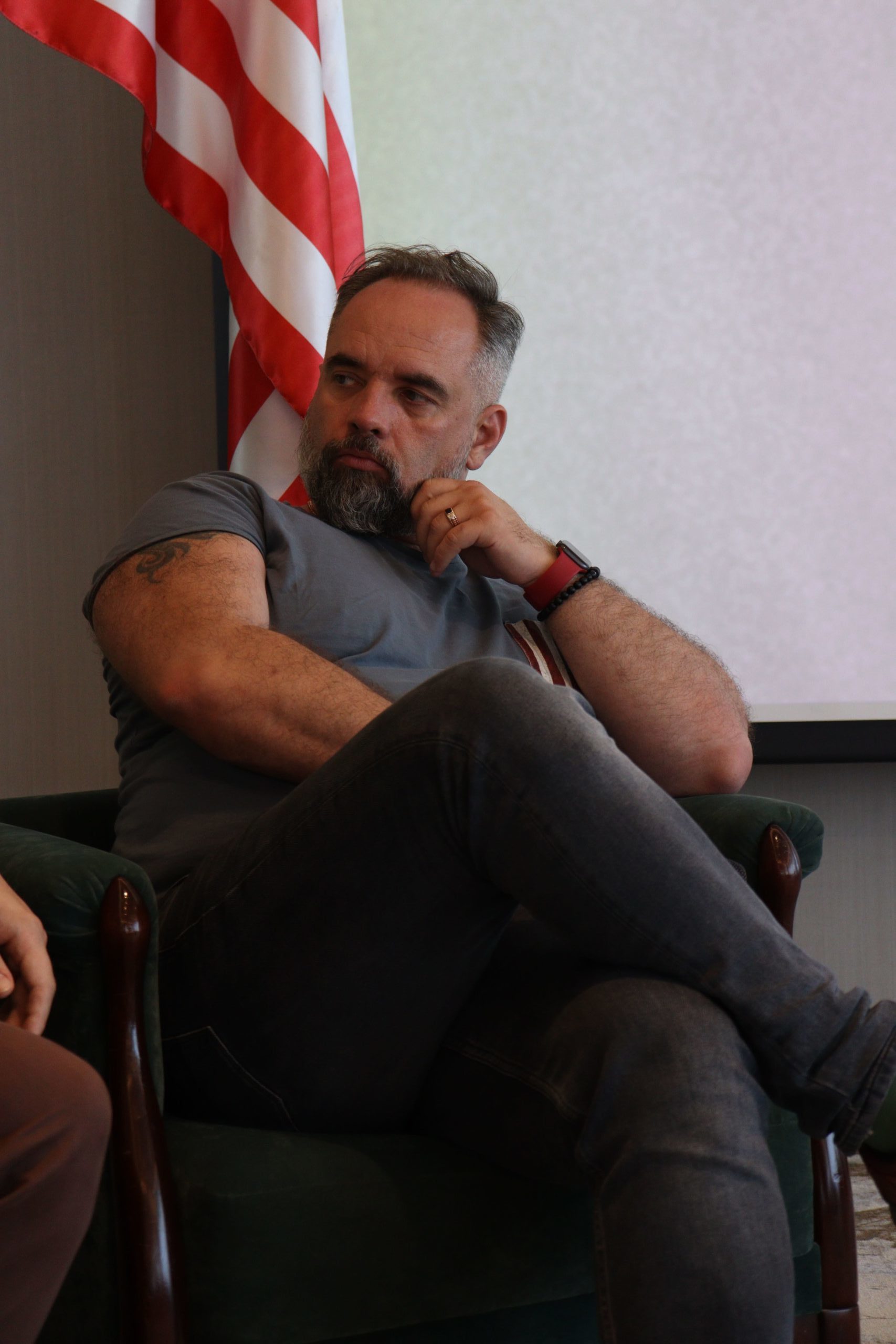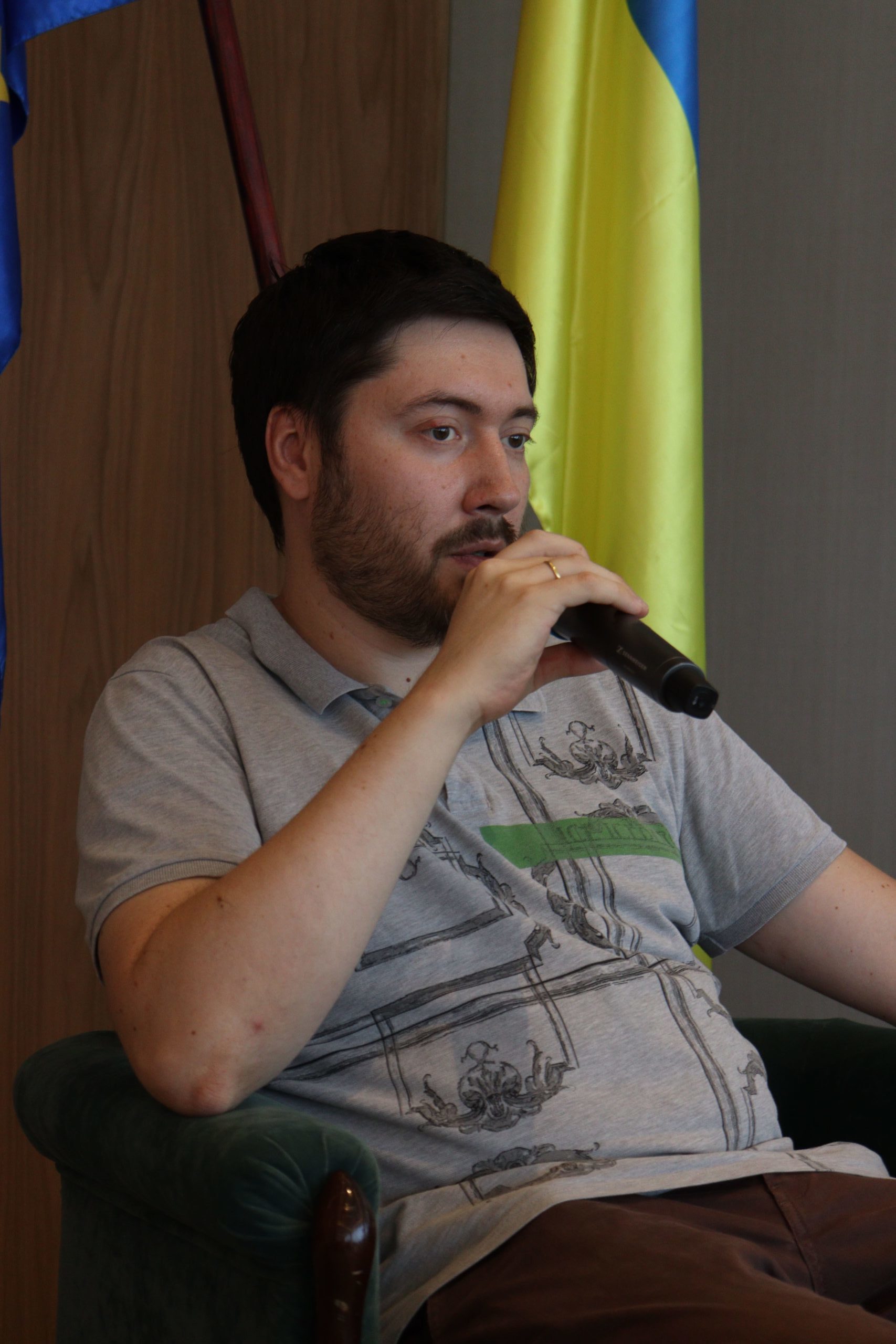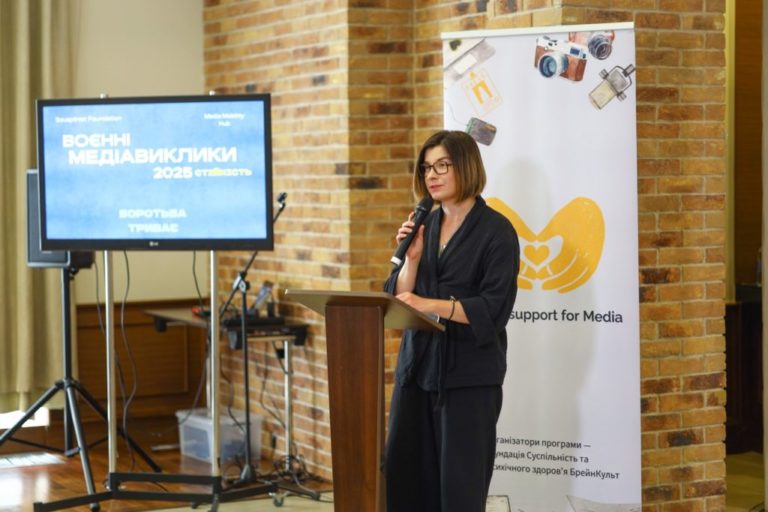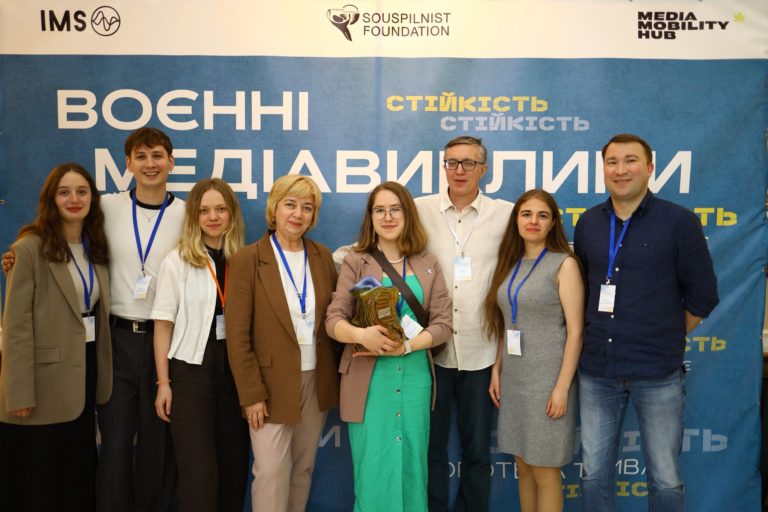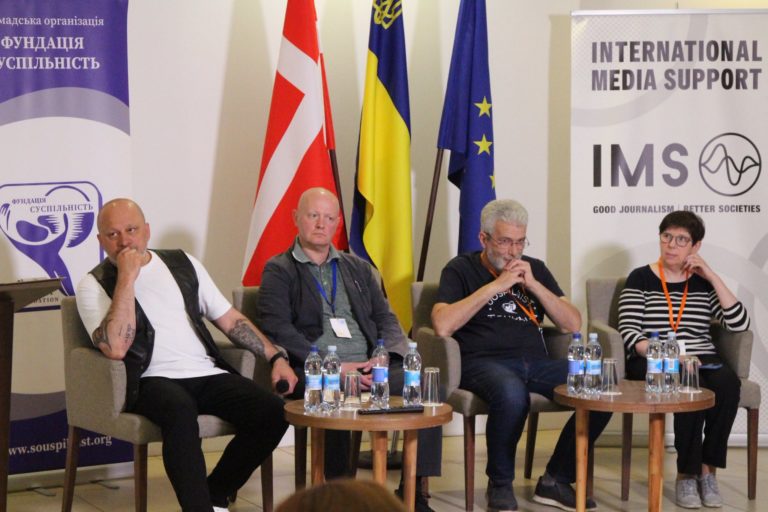On August 5-6, the annual Forum of the Media Intern Association (Media Mobility Hub program participants) and #2022 WARTIME MEDIA CHALLENGES conference took place in Kyiv.
This year, the two-day Forum’s central theme was wartime challenges for media work. The main discussions centered on the end-to-end platform “New experiences / writing stories and holding out / crisis media management / effective solidarity: the young media community’s look,” and the informal discussion, “What kind of journalism do we need to defeat the occupiers?”
The Forum was attended by more than 100 Media Mobility Hub graduates and more than 30 speakers (media experts, representatives of international organizations, charitable foundations, media, politicians, etc.).
For two days non-stop, the Forum’s organizers held six discussions and two practical panels. Awards were made for advancement in the profession (“Breakthrough!”) and “for upholding professional values in special conditions”. Souspilnist Foundation’s projects were also presented.
We will highlight the main takeaways from the Forum.
Written by Marharyta Yukhymenko
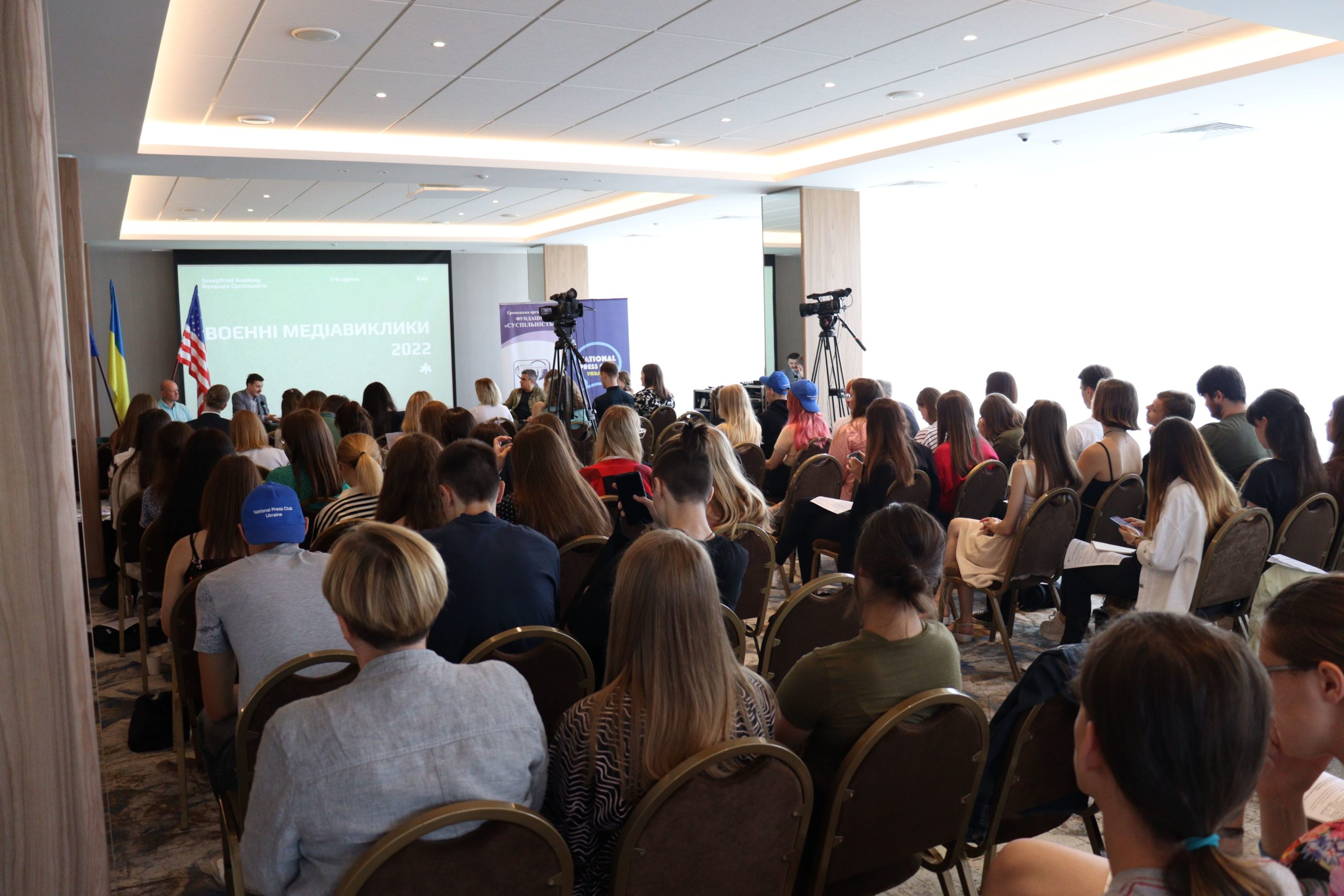
Oksana Maidan, Media Program in Ukraine deputy manager; Taras Shevchenko, Deputy Minister of Culture and Information Policy; Christopher Atwood, advisor group head at Souspilnist Foundation; and Oleh Pastukhov, Media Development Fund coordinator at the US Embassy in Ukraine, delivered welcome speeches to the participants.
This year, we’re working in special conditions of a great war – russia’s aggression against Ukraine. Internews Ukraine conducts an annual survey of Ukrainians’ media consumption habits. Even before the war, we saw social networks coming up on top and becoming the platforms where Ukrainians get news in the first place. Will traditional journalism, as we know it today, survive with consumers of information divided into interest groups and living in their information bubbles? Answering this question will take time. No matter what, society will still need competent information front workers adhering to ethical standards, whose purpose is not just to earn money but to take part in developing their state, Oksana Maidan addressed the Forum participants.
Ukraine is still the focus of interest for the foreign audience, but this interest is decreasing monthly. Yet Ukrainians have already been noticed in the global media space. Now, our journalists’ task is to be primary sources of information about Ukraine.
Ukrainians have spoken out as a society, expecting to be heard. Americans are starting to understand that they should listen to what Ukrainians say. We see how Ukrainians are defending their territory, their land. We listen to Ukrainian stories, and we read what Ukrainian journalists write. We’re beginning to understand that Ukraine is the center of this story, Christopher Atwood emphasized.
Today, countering disinformation is one of the most important things. Coordinating activities is essential during wartime. Therefore, we’re trying to coordinate state and private information capacity. An example of this is the TV marathon. I’m sure had the channels not merged at the war’s beginning, some of them would have gone off the air in the first month because of technical problems. Instead, this “insurance system” made it possible to have a high-quality picture everywhere simultaneously. How it happened is both an interesting and unique story, Taras Shevchenko said.
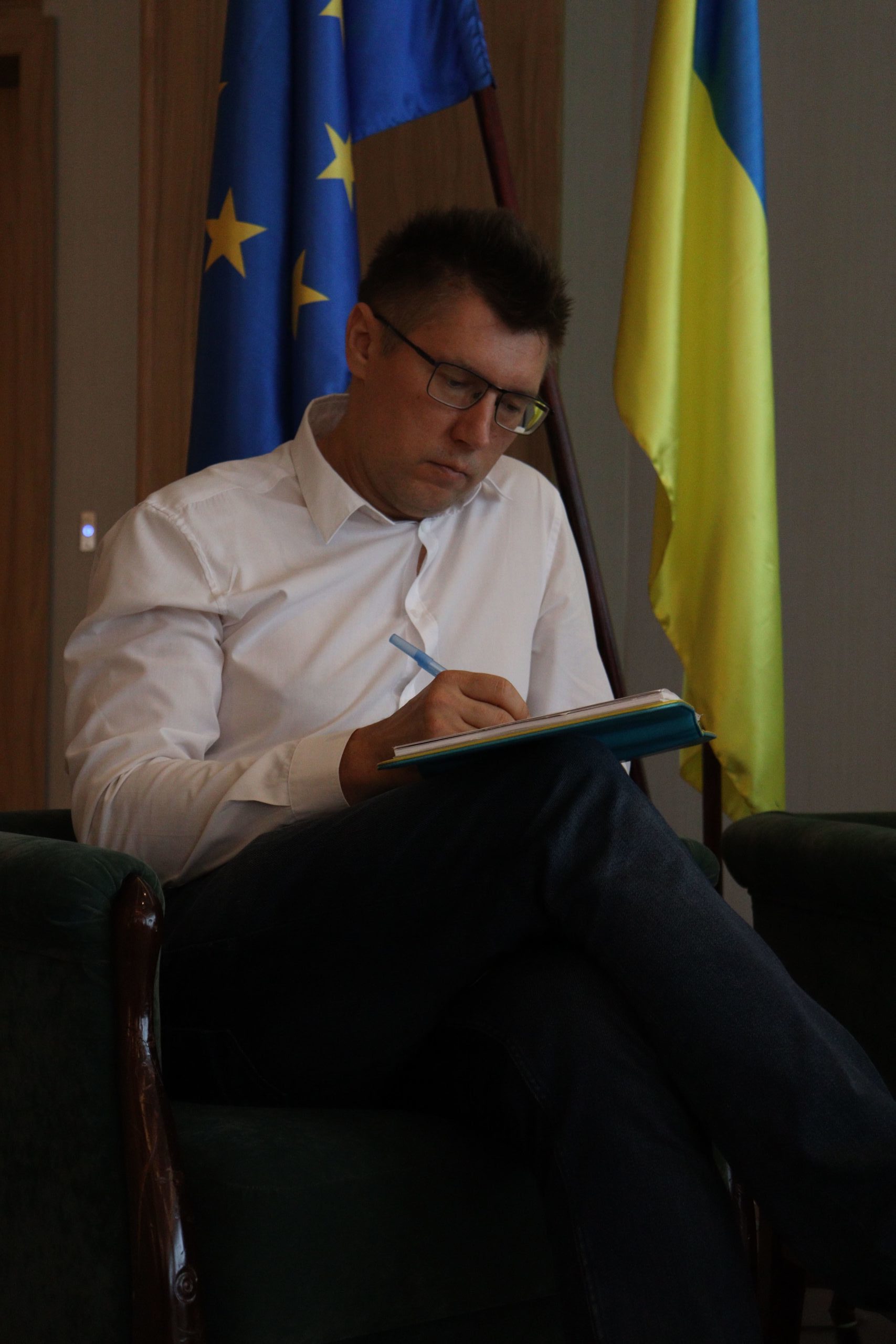
The discussion moderators were Taras Petriv, president of Souspilnist Foundation; Dmytro Tuzov, host at Radio NV; Viktoriia Kovtsun, a journalist at the 1+1 TV channel; Arsen Tsymbaliuk, host at Channel 24; Olha Kryzhanovska, a participant in the 21st session of the Media Mobility Hub; and Yuliia Malynka, a participant in the 22nd session of the Media Mobility Hub.
Professional standards and journalistic ethics vs. propaganda: where are the boundaries of what’s possible?
All Ukrainian journalists have been working on the information front for over four months of a full-scale war. Yet can journalistic standards be effective in wartime, and are media workers following them? Can journalistic ethics protect journalistic pieces from drifting into propaganda?
Natalia Lihachova, chief editor at the Detector Media group of publications; Iryna Slavinska, executive producer at Radio Culture; and Liubomyra Remazhevska, a journalist at Slidstvo.Info, provided answers to these questions.
The main idea is that journalistic standards should exist in wartime. However, all three female speakers agreed now there is room for cutting it some slack.
We developed this algorithm for our newsroom: we accept official information unconditionally if it concerns war and russian aggression. However, we question information about internal political processes, Natalia Lihachova shared her experiences.
Journalists are full-fledged participants in this war, not merely observers. But as professionals, they have no right to mingle personal and work matters. Besides, martial law somewhat limited professional activity, so the editors had to adapt to new conditions.
I know about situations where colleagues transitioned from news journalism to some other journalism after 2014 or after February of this year. Some started doing reportage, leaving more room for personal impressions. Some work with military topics not in the news format but the storytelling format, Iryna Slavinska noted.
We had to re-format our work because our country’s at war, and the registers are closed for security reasons. In principle, the traditional work of an investigative journalist dealing with high-ranking corruption has become virtually impossible in our country. We had to discuss how we could be useful in the war, so we changed our profile. First, we’re trying to spot and identify the russian soldiers committing war crimes on Ukraine’s territory. Second, these are reports from de-occupied and front-line areas, Liubomyra Remazhevska said.
How to counter the russian disinformation machine’s narratives in Ukrainian and global media?
The international partners’ support for Ukraine depends on whether Ukrainian journalists can deliver the truth to the global audience in a high-quality manner. Russian propaganda outlets also understand this, so they constantly try to twist current and historical events in a way beneficial to them. It’s long been clear that it’s not enough for us to tell the truth; we must also debunk lies.
Vadym Miskyi, program director at Detector Media; Kostiantyn Kvurt, chairperson of the board of Internews Ukraine; and Otar Dovzhenko, chairperson of the Independent Media Council, addressed the issue.
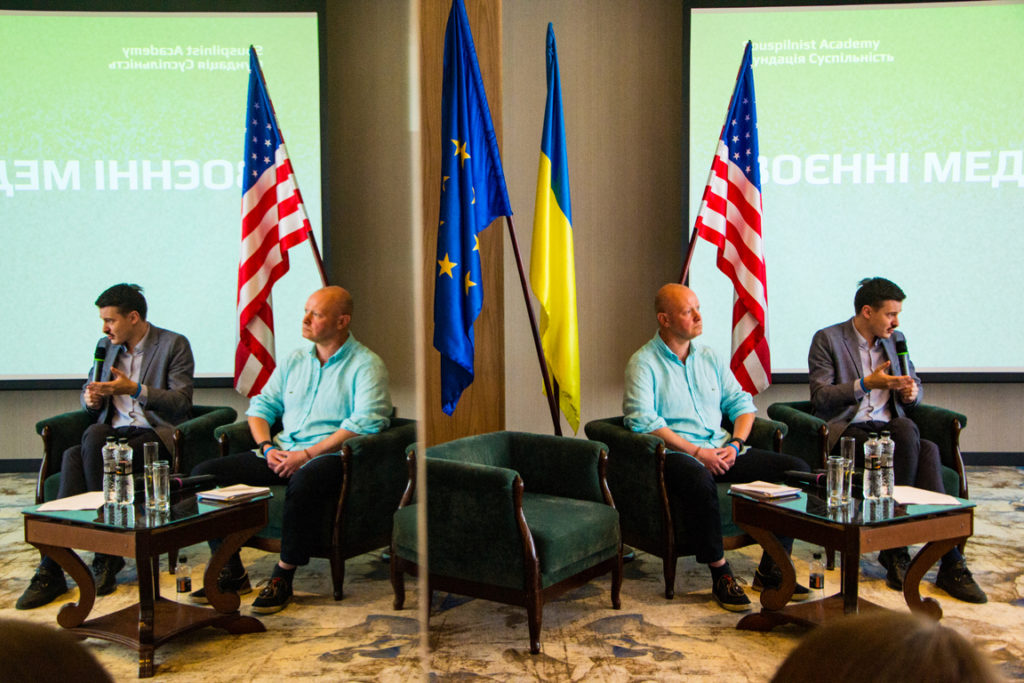
We can offer essential know-how to the world. If you want to remove russian propaganda’s sting, you must remove the ‘hardware sting.’ It would help if you blocked the signal, stopped providing platforms and expanding its channels, and did not allow it to weave into national media spaces because it can mimic things very well, Otar Dovzhenko noted.
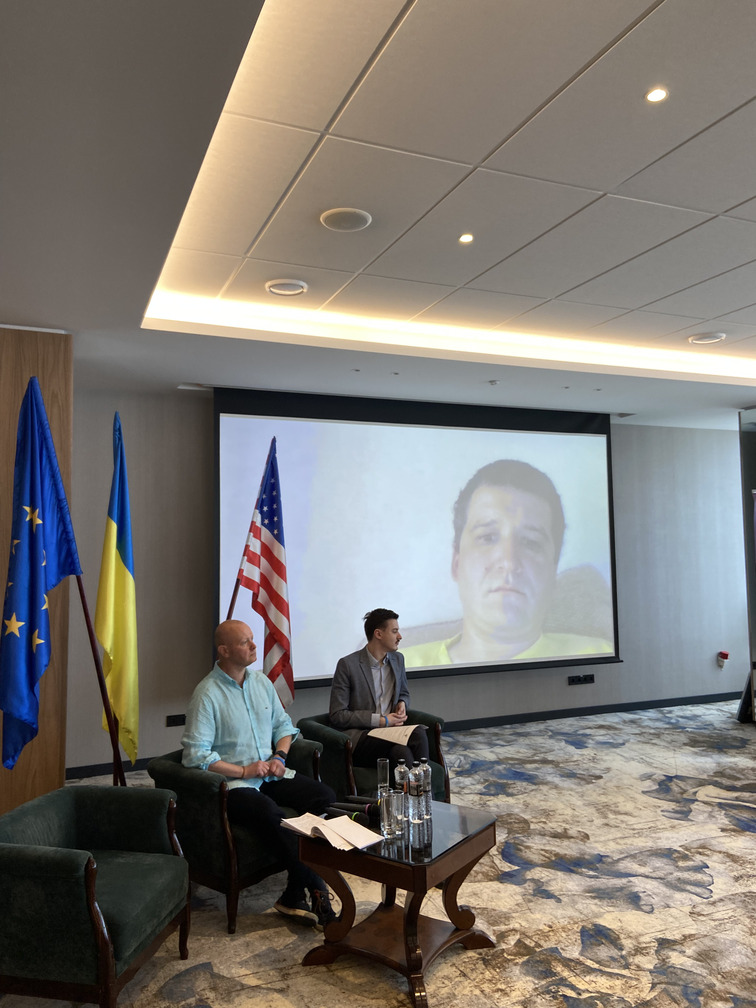
There’s only one way to counter it. We need to generate even more of our own content to fill the vacuum. If we don’t say it, they will. They’ll reach out because they have a lot of resources, Kostiantyn Kvurt added.
During the discussion, the participants pointed to the content language issue as stirred up by russian propaganda.
Regarding the language of the radio and TV content, at the Detector, we surveyed the Ukrainian-controlled part of the Donetsk and Luhansk regions back in 2017. We found that content language was not a choice factor for residents of these territories. They regularly watched Ukrainian TV channels, and everything was clear and interesting to them. There was no need for a separate russian-language product. No such demand was made, Vadym Miskyi said.
Organization work in combat zones: how to tell Ukrainian/foreign audience about the war in Ukraine?
Before going to the front lines to tell others about the events in the epicenter of resistance, journalists must have answers to several questions. Are they ready to see it for themselves? What goals are they pursuing by trying to get to the front lines? Do they know how not to come up with their stories in harm’s way?
Dmytro Tuzov, program host at Radio NV; Anhelina Kariakina, information broadcasting general producer at UA:PBC; and Tetiana Yakubovych, editor at Radio Liberty’s Donbas.Realii project, spoke about how Ukrainian journalists work on the battle line and what newsrooms should do in this situation.
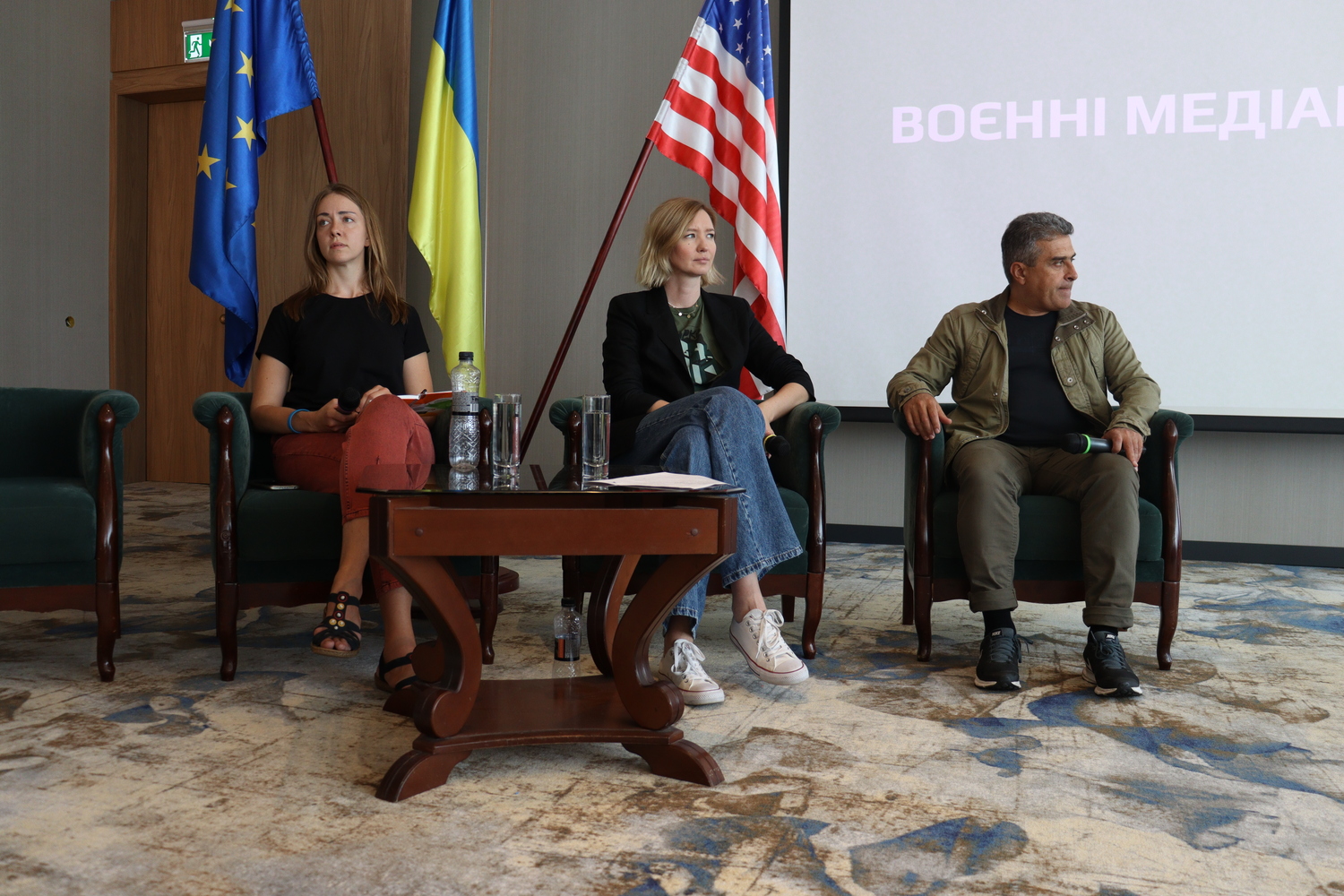
Believe me, russians have enough resources, including technical ones. When they say their army is lagging behind, etc., that’s only partly true. They have a serious fleet of drones, quite capable Orlan drones. I’d not recommend that we ‘primitivize’ the enemy, Dmytro Tuzov advised.
Being curious is a basic journalistic instinct; you all should be curious. I want to see everything with my own eyes, talk to people, and figure things out. We want to become the voice of the people we’re featuring. But the key thing is the editorial task. If someone can’t articulate why they’re going to Donbas, what story will they come up with there? That person shouldn’t go there because the story will end up being bad, Anhelina Kariakina remarked.
Journalists should remember that covering the home front is as important as reporting from the front lines.
I want to stress the importance of home-front journalism now. As an editor, it seems we really lack it at the moment. Working on the front line can be psychologically easier because you see the enemy clearly, have a nice black-and-white picture and meet wonderful people there, soldiers. The aggressors are sitting on the other side. However, some social problems on the home front might be very depressing. When you see that the country faces issues during the great war, you don’t want to deal with them. Because they are challenging to digest, Tetiana Yakubovych shared her opinion.
Successful crisis media management: the Public Broadcaster on the wartime march
Mykola Chernotytskyi, chairperson of the board at UA:PBC; Svitlana Ostapa, chairperson of the supervisory board of UA:PBC; Tetiana Kysekchuk, UA:PBC board member responsible for information broadcasting and digital platform; and Viacheslav Mavrychev,chief news editor at UA:Kharkiv, told the forum participants about the steps that helped their newsrooms prepare for the war and withstand the crisis brought about by the full-scale war, and about mistakes and non-correspondence between plan and reality.
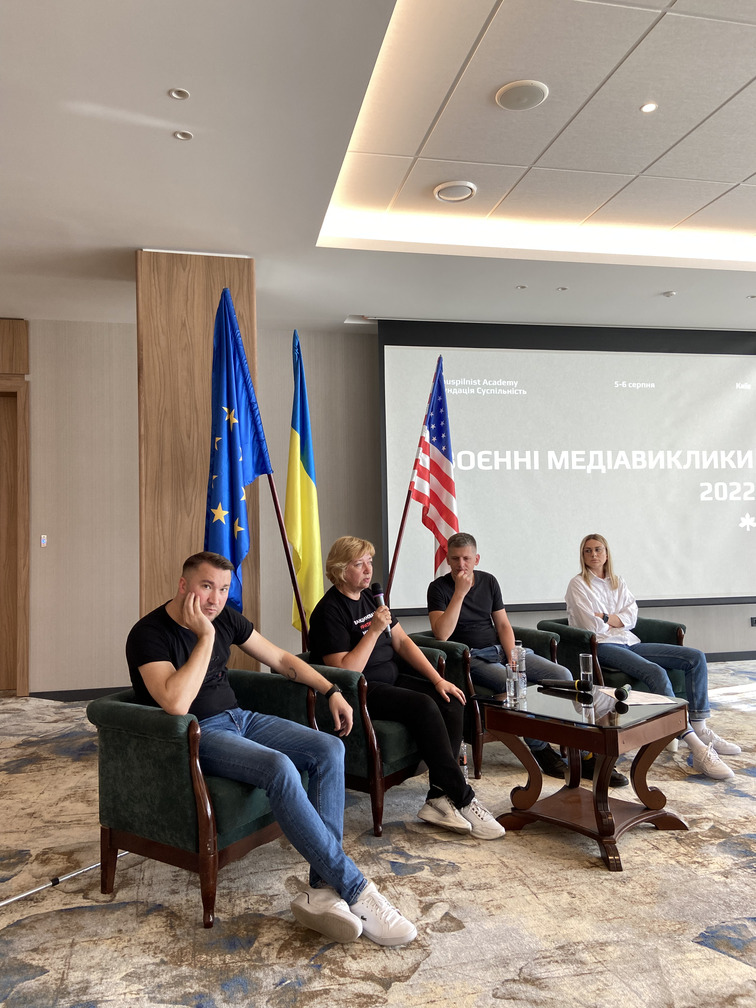
Our plan regarding full-scale invasion turned out rather helpful, allowing us to make calm decisions. We knew that if it happened, we’d go to Lviv, regroup, etc.
One thing we didn’t consider that didn’t work was that we wrote out a list of people who absolutely had to go. And the list worked for 30-40% because people started evacuating their families. It looks logical now, but when we were writing it, we thought entirely differently, Mykola Chernotytskyi shared his experiences.
During a full-scale war, newsrooms can evaluate their strategies’ effectiveness and forms of communication with the audience and within the team.
There’d been five years of reforms before the full-scale war. We took many steps, and I don’t mean the protocol we devised a month before the war. I’m talking about our daily work. For instance, we launched a website in 2019. In fact, we did it quite late. By then, Ukrayinska Pravda had had a website for 20 years. But if we hadn’t done it in 2019, we wouldn’t now have 10 million unique readers and their trust during the invasion. It’s the same with social networks. Twenty-four regional branches have their social network pages. Overall, there are about 150 pages that must be maintained carefully. In the six months of 2022, our Facebook grew by 70%, YouTube by 100%, and Viber by 3,600%. These channels indirectly saved lives because people understood what was happening and where, Tetiana Kiselchuk said.
It looks like everything that happened at UA:PBC over the last five years prepared us for this war. When I joined as news editor, we only had tape cameras. It was 2017. We couldn’t even buy cassettes because they’d been discontinued for ten years. We had to learn to film things on our own phones.
Because of chronic underfunding, we had no money for transportation. We learned to figure things out quickly by exploring convergence to become universal fighters. So, when we heard the first explosions in Kharkiv on February 24, we already knew what to do, Viacheslav Mavrychev said.
In the first month, no one monitored what was being done in the TV marathon regarding compliance with standards. Honestly, we had other things to do. But then Detector Media decided to resume monitoring. We believed the war was not an excuse to produce low-quality content. In fact, there are no complaints about UA:PBC’s content. There’s no political PR, and we provide verified information, Svitlana Ostapa noted.
European perspectives: what kind of media law do the media market and the journalistic industry need?
The law on media has stirred discussion for many years. Ihor Rozkladai, deputy director at CEDEM, and Kateryna Miasnykova, executive director at the NMA, explained to the forum participants the future law’s main provisions and scope of application. According to the speakers, it is an industrial law on money.
It’s a law about the game’s rules, i.e., how the media should interact with consumers, with the state, and among themselves. The law certainly doesn’t establish the rules of ethical norms for journalists. It’s not about that, Ihor Rozkladai explained.
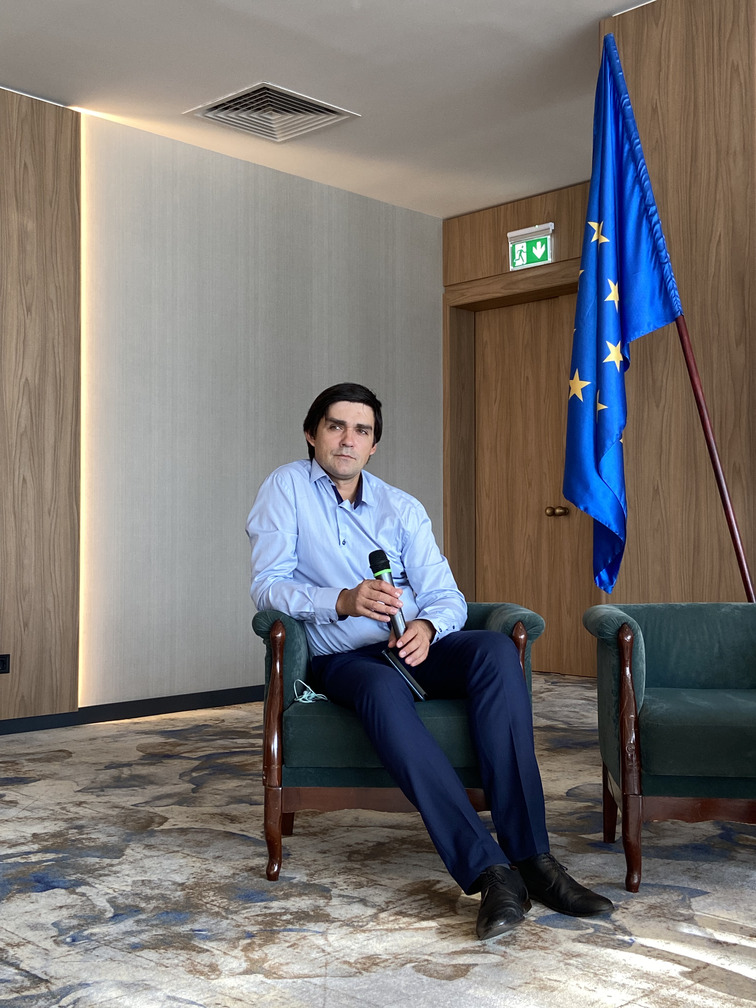
The media law doesn’t contain a single line about the responsibility of journalists. According to the media law, media outlets bear responsibility. That is, the ones providing journalists with a platform,” Kateryna Miasnykova said, answering a participant’s question.
Presenting the “Breakthrough!” award for advancement in the profession and a special prize, “For upholding professional values in special conditions.”
For the first time, two media workers became finalists: Maryan Kushnir, a journalist at Radio Liberty, and Iryna Sayevych, a journalist at UA:PBC and graduate of the 7th Media Mobility Hub.
Yevhen Spirin was given a special award: “For upholding professional values in special conditions.”
I must say that today’s journalism is not about honors and awards. No amount of Pulitzers and words of gratitude will replace people. Many people who covered the war are not with us today: Maks Levin, Sasha Mavkul, Vira Hyrych, and many others. It seems to me these awards should go to them. They deserved it, Maryan Kushnir said.
How to tell wartime stories in a special way
Yevhen Spirin, editor-in-chief at the Babel publication, and Yaroslav Druziuk, editor-in-chief at The Village Ukraine, spoke about the formats of covering stories in wartime. They also shared why people consume wartime stories that look boring at first sight and what changes they introduced to the media outlets’ editorial policies.
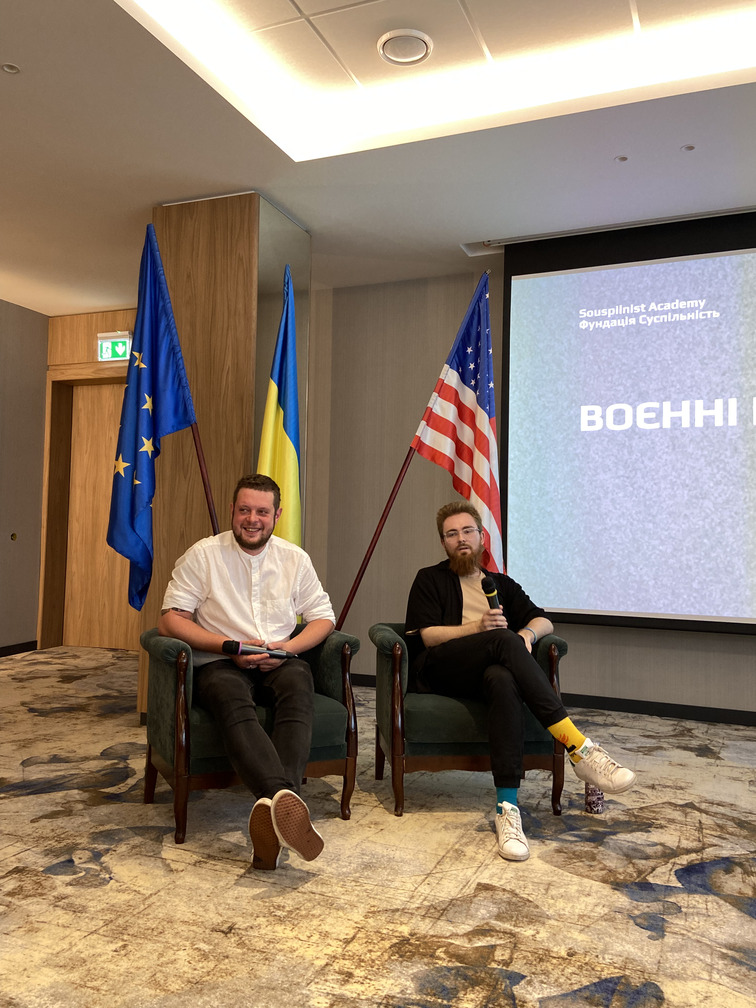
Our newsroom’s main conclusion for the six months of the full-scale war is that we must be on the ground. It’s essential for those writing reports or covering any topic or industry: you need to delve into the subject and, ideally, go to the locations, Yaroslav Druziuk said.
Media challenges 2021. Latest challenges, success stories, and effective changes: A view of the young media community: http://surl.li/cquwz.
A conversation for the chosen ones. A special session of professional questions that are difficult to answer
Journalists sometimes find themselves in situations where it is necessary to make some concessions to get characters for socially significant topics. At such moments, everyone makes decisions independently, based on their beliefs and principles.
Andrii Kulykov, chairperson of the board at Hromadske Radio and CJE chair, spoke about ambiguous situations and his own mistakes while working during Soviet times and at the BBC. He emphasized the ineffectiveness of propaganda in working with the audience:
Propaganda is effective as long as the propagandists believe what they are saying. For a while, I believed at least part of what I pitched, making efforts to sound more convincing. Then came the time when I realized it was wrong. Propaganda is absolutely not suitable for a serious conversation with people. Therefore, I’d talk about the popularization of something positive.
The Kyiv Independent case: a Ukrainian English-language media outlet’s experience
The entire media community closely followed the creation of the English-language publication “The Kyiv Independent” before the full-scale war. It was an example of the self-organization of leading journalists, uniting in their own newsroom and creating a truly independent publication.
It was also a lesson. We realized perfectionism was good, as were dreams, goals, and ideas. Ambition was great, but there was a harsh reality, and sometimes there were things we had to put up with, said Anna Myroniuk, a journalist for The Kyiv Independent.
Political interview techniques: wartime challenges
Olena Removska, host at UA:PBC, shared her own experiences as a political interviewer, speaking about the opportunities that knowledge of foreign languages provides for a journalist, the nuances of preparing for a conversation, and what information is necessary for correctly perceiving the interviewee. She also shared some tips on conducting a successful interview.
Protect your reputation. You’ll be ashamed at some point that you didn’t. Promote yourself; it’s crucial. Your name should speak for itself. Therefore, use all legitimate ways to promote yourself. This will help you a lot in finding a job or character for your piece, Olena Removska said.
The work of youth media outlets during the war
All newsroom teams are interested in attracting young audiences. Anastasiia Bakulina, CEO of the “Svidomi” publication, spoke about the media of young people for young people, about the peculiarities of each media outlet, and a desire to lead the audience.
We’ve realized we need to reach out to the audience: even if they don’t like something in our stories at first or don’t understand why they need to know it, we’ll explain it to them rather than refuse to publish it, explained Anastasiia Bakulina.
Novel wartime communication tools
To defeat the enemy, it is necessary to unite forces and consolidate society. Besides journalists and politicians, public organizations and activists face this task. Mariia Pysarenko, communications director at the Prytula Foundation, and Ivan Marunych, a blogger and musician, spoke about how to raise money for a Bayraktar drone and why crowdfunding should not be boring.
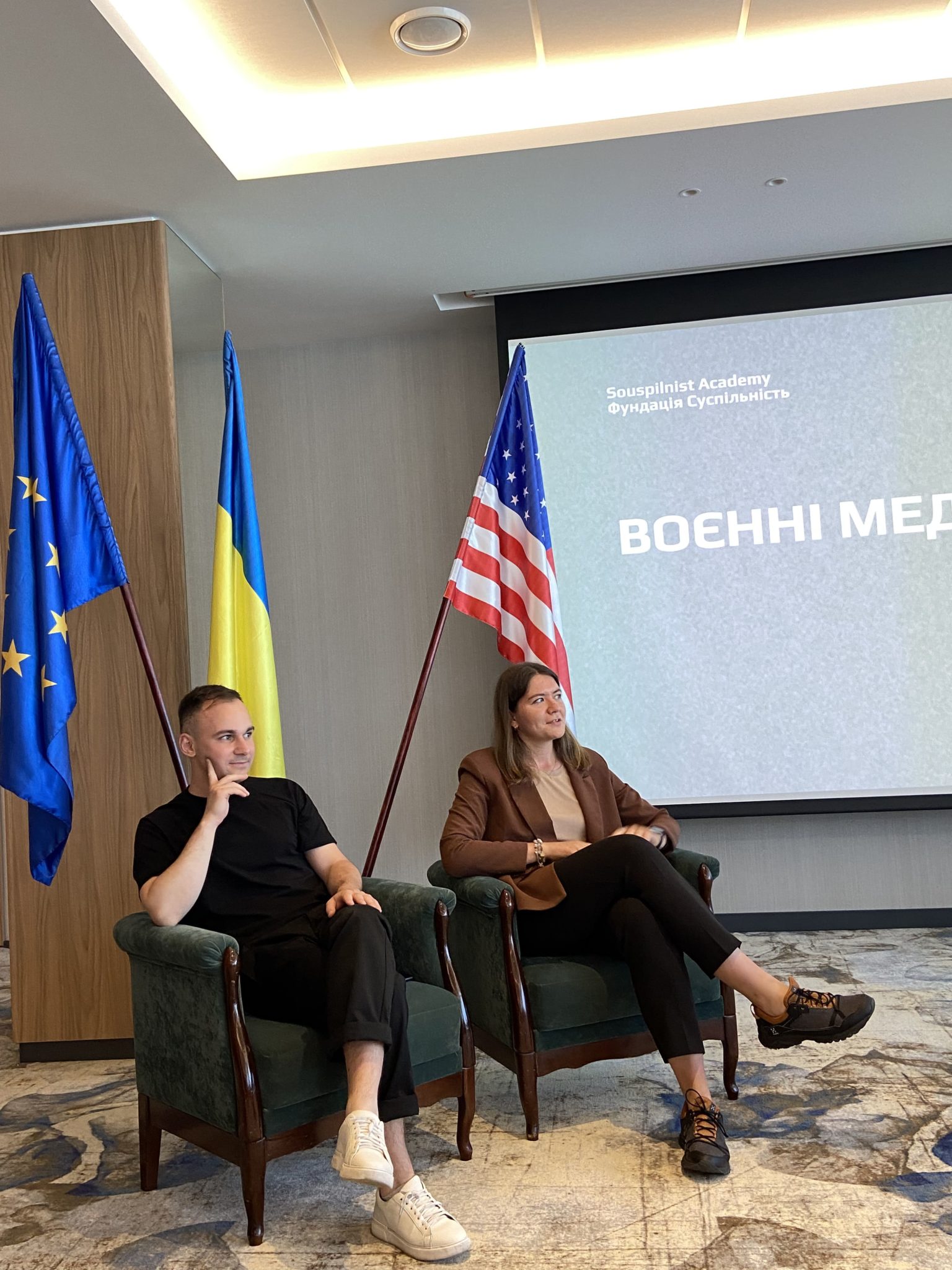
A simple and clear image worked during the ‘People’s Bayraktar’ fundraising campaign. Bayraktar is a symbol of war, and the Ukrainians donating for a Bayraktar are an incredible force of ordinary people who can collect enough to buy a very complex and powerful weapon, Mariia Pysarenko said.
The Forum also included presentations of Souspilnist Foundation’s Heroes for Freedom project conducted by Viktoriia Dubinets and of the International Journalist Insurance Fund by Olena Shakhova, head of Souspilnist Academy.
What about the money? Newsroom’s survival experiences in wartime
Newsrooms’ financial capacity in wartime does not look very optimistic. Managers seek solutions that would help attract funding, and they have to abandon old projects and quickly adjust processes to new ones. Andrii Boborykin, representing Ukrayinska Pravda, and Valerii Harmash, representing “Slovyansk City Site – 6262,” spoke about what to do to stay afloat.
It’s a sad phenomenon wherever there’s a Ukrainian audience. If someone’s going to YouTube while in Ukraine, they don’t see ads at all or see the performance of an Indian artist who has a lot of money and has been advertising his video clip worldwide. The small competition of Ukrainian advertisers is spread out over this large audience. It means a Ukrainian YouTube channel with Ukrainian advertising will earn very little, Andrii Boborykin explained.
Despite the war, our country is moving towards European integration, which raises many questions about the Ukrainian media market’s potential competition with the European one.
There’s a tremendous bias that the European market is oversaturated. No one’s analyzed what’s happening in Europe. Looking at how the European market works, you realize we did it back ‘in the first grade.’ Their rhythm is very calm because not much is happening there, Valerii Harmash shared his observations.
Psychological stability of journalists and media teams in wartime: how to effectively cope with psychological problems
Mental health is relevant for anyone under any circumstances. The war poses new challenges to Ukrainians, and we must learn the peculiarities of wartime psychology. Andrii Sydorenko, Resilience Hub project manager, made sure we did.
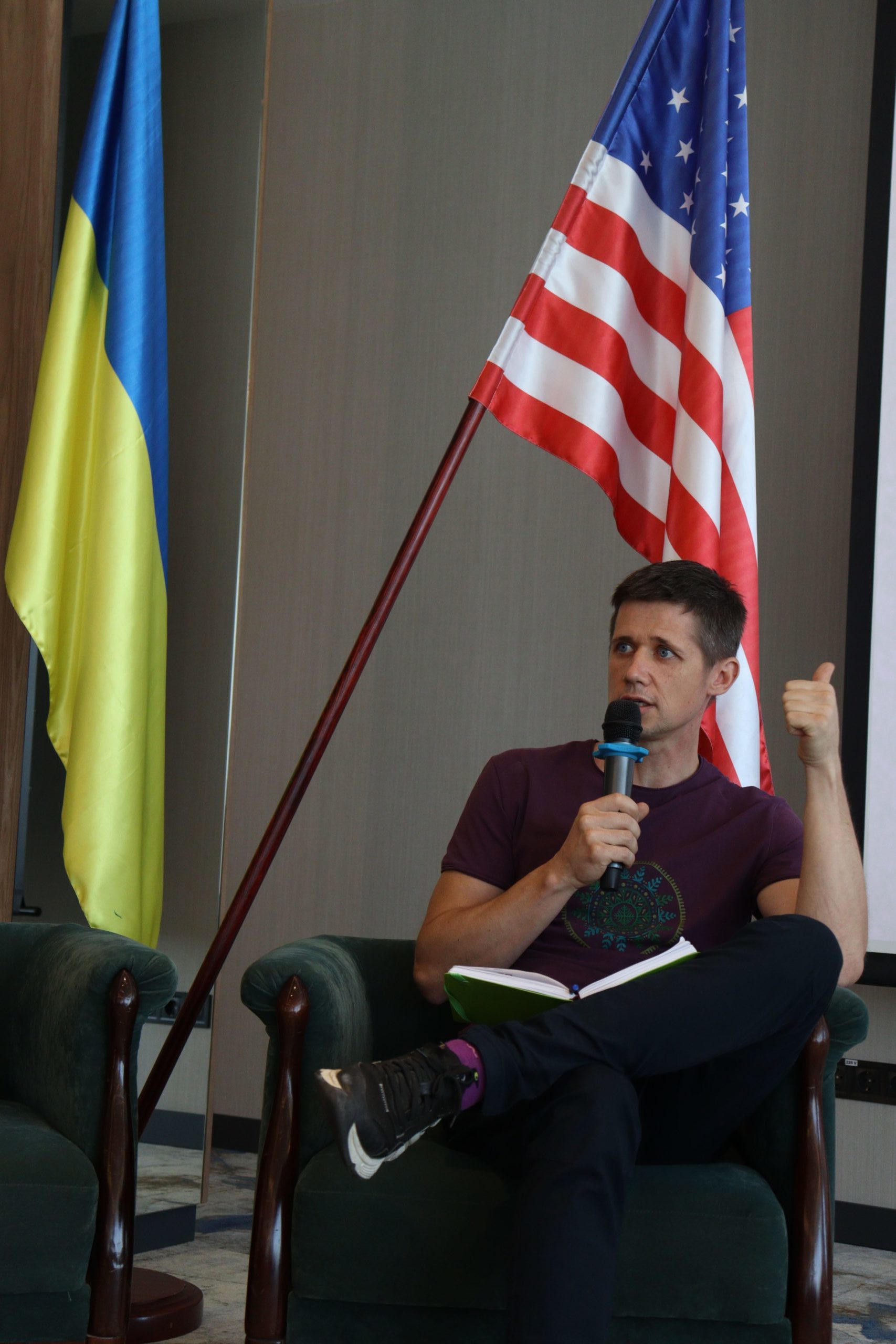
Mental health is about adaptability: the extent to which you’re ready to make adjustments to your action plan in the face of uncertainty and regulate your physical and psychological reactions that may arise, Andrii Sydorenko explained.
The annual meeting of the Media Intern Association (Media Mobility Hub program participants) concluded with electing heads of the Association. During the collective discussion, it was decided to re-elect president Vasyl Arovych, UGC Producer at UA:PBC, and his deputies Viktoriia Kovtsun, a reporter at 1+1, and Anastasiia Shybiko, director of Free Radio in the Donetsk region, for a second term.
The event was made possible with the support of the USAID-funded Media Program in Ukraine implemented by Internews and with the help of private donors.
